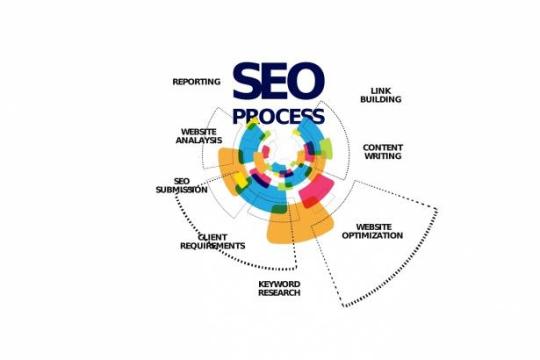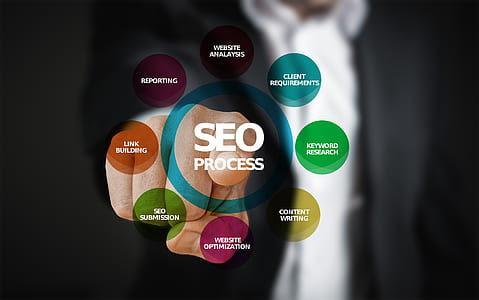Don't wanna be here? Send us removal request.
Text
Boosting Real Estate Listings Visibility with AI-Powered SEO Tools
Boosting Real Estate Listings Visibility with AI-Powered SEO Tools
Introduction In today’s digital age, real estate agents face an increasingly competitive market, where standing out online is more challenging than ever. Many agents struggle to get their listings noticed, rank higher on search engines, or reach the right audience. Traditional SEO methods, while essential, often fall short due to time constraints, manual processes, and changing algorithms.
Fortunately, AI-powered SEO tools are revolutionizing the way real estate agents optimize their online presence. These tools not only save time but also offer precise, data-driven insights, ensuring that your listings get the attention they deserve.
What You’ll Learn: In this article, we’ll explore how AI-powered SEO tools can enhance your real estate listing visibility, share expert tips on implementation, and illustrate real-world examples to highlight how AI can give you a competitive edge. Whether you’re new to AI or seeking advanced strategies, this guide is designed to provide actionable insights to help your listings reach more potential buyers and renters.
Main Content
1. The Power of AI in SEO for Real Estate
Explain AI-Powered SEO: Define what AI-powered SEO tools are and how they differ from traditional SEO approaches.
Benefits for Real Estate: Highlight the specific benefits of AI in real estate SEO, such as improving keyword research, automating content optimization, and analyzing user behavior in real-time.
Real-World Example: Mention a real estate agent who increased their listing visibility by 30% after using AI-based SEO tools. Explain how AI helped optimize their keywords and analyze competitor strategies.
2. Key Pain Points in Real Estate Listing Visibility
High Competition: The sheer number of listings makes it hard to stand out.
Time-Consuming Processes: SEO can be complex and time-consuming, especially for agents juggling multiple tasks.
Lack of Targeted Audience Insights: Knowing the right audience and their search behavior is crucial for driving conversions.
Changing Algorithms: Search engines constantly update their algorithms, making manual SEO efforts difficult to keep up with.
3. How AI-Powered SEO Tools Solve These Pain Points
Subheading: Automated Keyword Research and Optimization
AI-Powered Keyword Tools: Describe how AI tools can quickly generate high-ranking keywords specific to real estate (e.g., "luxury condos in downtown NYC").
Real Estate-Specific Suggestions: AI tools analyze the performance of related terms to suggest high-value keywords with less competition, helping agents reach potential buyers more effectively.
Example Tool: Mention tools like MarketMuse or Ahrefs, explaining how they analyze keywords for better real estate listing visibility.
Subheading: Content Optimization and Analysis
AI Content Suggestions: Explain how AI tools analyze top-ranking pages and suggest content improvements that align with search engine preferences.
Real Estate Application: Describe using AI to optimize listing descriptions, blog posts, or neighborhood guides, so they attract search traffic.
Case Study Example: Talk about a real estate website that increased its traffic by 40% after integrating AI-powered content optimization tools.
Subheading: Audience Targeting with AI-Driven Analytics
User Intent and Behavior Tracking: AI tracks user behavior on listings, understanding what attracts or deters visitors.
Personalized Recommendations: AI can recommend different listings based on user behavior, enhancing customer experience and retention.
Example: Share how an agent leveraged AI-driven analytics to identify trending locations, allowing them to adjust their listings and boost visibility in high-demand areas.
Subheading: Automating SEO Tasks for Efficiency
Automated Reporting: AI generates regular SEO performance reports, enabling agents to quickly see what’s working.
Competitor Analysis: Explain how AI tools monitor competitors, helping agents adapt their strategies accordingly.
Time-Saving Example: Talk about how a real estate agency cut SEO time by 50% with AI-powered automation tools.
4. Expert Tips for Implementing AI SEO Tools in Real Estate
Subheading: Start Small with One or Two Tools
Focus on one area of improvement first, like keyword research or content optimization, and then expand based on results.
Subheading: Analyze Competitors in Your Area
Use AI to evaluate high-ranking local competitors. Look at their keyword strategies, content structure, and backlinks.
Subheading: Create AI-Optimized Content for Local SEO
Local SEO is crucial for real estate. Optimize your listings with location-specific keywords (e.g., "two-bedroom apartments in San Diego").
Consider creating neighborhood guides and city highlights, using AI suggestions to find high-traffic local keywords.
Subheading: Regularly Update and Optimize Listings
Set up regular listing updates with AI insights, as fresh and relevant content helps maintain rankings.
Subheading: Track ROI on AI SEO Investments
Monitor how each AI tool affects your visibility and leads to ensure the investment is beneficial for your business.
Conclusion & Call to Action
Key Takeaways: In a competitive real estate market, using AI-powered SEO tools can be a game-changer. From enhancing keyword strategies to optimizing content and automating time-consuming tasks, AI allows real estate agents to focus more on closing deals and less on manual SEO processes.
If you’re ready to transform your real estate business with AI-powered SEO, reach out to us for a free AI audit. Our team of experts will identify the best AI tools for your specific needs, providing a tailored strategy to boost your listings’ visibility and attract more clients. Start taking your real estate business to the next level with AI today!
0 notes
Text
Leveraging Technology in Real Estate: A Guide to Digital Transformation
Leveraging Technology in Real Estate: A Guide to Digital Transformation
Introduction
The real estate industry has entered a transformative era, with technology reshaping how agents, brokers, and investors operate and succeed. Traditional methods are evolving rapidly as digital solutions become essential for staying competitive and meeting client expectations. However, with rapid changes come challenges – understanding, adopting, and effectively leveraging these tools can feel overwhelming.
In this guide, we’ll explore the core technologies driving the real estate industry forward and show how agents and real estate companies can adopt these tools to streamline their operations, boost lead generation, and enhance client satisfaction. From automating routine tasks to using predictive analytics for market insights, let’s delve into how you can harness technology to elevate your real estate business.
1. Addressing Key Challenges in Real Estate with Technology
1.1. Streamlining Operations
Pain Point: Real estate professionals spend a significant amount of time on repetitive tasks such as scheduling, data entry, and managing paperwork, which can reduce their focus on clients and deals.

Solution: Automation tools, such as AI-powered CRMs (Customer Relationship Management systems), streamline workflows by automating routine processes. For instance, a CRM can handle lead management, follow-up emails, and even appointment reminders, freeing up time for agents to focus on high-value activities.
Expert Tip: Use tools like HubSpot or Zoho CRM for task automation and lead nurturing to ensure no potential client slips through the cracks.
1.2. Enhancing Client Experience
Pain Point: Clients expect a seamless and transparent buying or renting experience. With the increasing digital expectations, clients want real-time updates, virtual tours, and accessible information.
Solution: Integrating virtual tours and AI-powered chatbots on your website or social media platforms can enhance client engagement and satisfaction. Virtual tours allow clients to explore properties from anywhere, making it easier for them to make decisions. AI chatbots provide instant responses to inquiries, keeping potential clients engaged even outside of business hours.
Real-World Example: Real estate giant Zillow uses AI chatbots to answer client questions, improving customer response times and reducing workload for agents.
1.3. Improving Lead Generation and Client Retention
Pain Point: Traditional lead generation can be time-consuming and inconsistent, making it hard to maintain a steady pipeline of interested buyers or renters.

Solution: Leverage predictive analytics and AI-driven lead scoring to identify high-potential leads more accurately. Predictive analytics analyzes data from multiple sources, such as social media engagement and browsing history, to help agents focus on clients most likely to convert. Additionally, AI-powered CRM tools can segment leads for targeted follow-ups, improving client retention.
Expert Tip: Use platforms like Salesforce Einstein or Leadspace to harness AI for effective lead scoring and client segmentation.
2. Key Technologies Transforming Real Estate
2.1. Artificial Intelligence and Machine Learning

AI and machine learning are crucial to making data-driven decisions in real estate. AI can analyze vast amounts of market data to identify trends, price predictions, and property value insights. Additionally, machine learning algorithms can detect client preferences based on their browsing habits, enabling agents to offer personalized recommendations.
Benefit: Better decision-making and increased client satisfaction through tailored property suggestions.
Real-World Example: Compass, a leading real estate firm, leverages AI to analyze market trends and provide data-driven insights for their agents, resulting in more accurate pricing and targeted marketing.
2.2. Virtual and Augmented Reality
Virtual reality (VR) and augmented reality (AR) have become game-changers in showcasing properties. With VR, clients can take immersive tours of properties from anywhere, while AR allows agents to stage properties virtually, showing potential buyers the property’s potential without physical staging.
Benefit: Improved client engagement and faster decision-making by providing clients with a comprehensive view of properties.
Expert Tip: Consider using platforms like Matterport for VR tours and RoOomy for AR staging.
2.3. Data Analytics and Predictive Analysis

Predictive analytics is helping real estate professionals anticipate market trends, understand pricing dynamics, and optimize their investment decisions. By analyzing historical data and current market conditions, predictive analytics tools can help agents identify emerging hot markets or determine the best times to list properties.
Benefit: Increased profitability and efficiency by making informed decisions based on data-driven insights.
Real-World Example: Redfin uses predictive analytics to help their agents identify the best neighborhoods for investment, giving them a competitive edge in the market.
2.4. Customer Relationship Management (CRM) Systems

A powerful CRM system is essential for managing leads, nurturing client relationships, and automating communication. Today’s CRMs are powered by AI, offering lead scoring, follow-up automation, and detailed insights into client behavior.
Benefit: Enhanced client relationships and improved lead management through automation and data insights.
Expert Tip: Opt for AI-integrated CRMs like Zoho CRM or Salesforce to streamline your lead and client management process.
3. How to Implement Technology in Your Real Estate Business
Step 1: Start with a CRM System
Actionable Tip: Begin by integrating a CRM system into your business processes. Ensure it has AI capabilities to automate lead scoring, follow-up emails, and data analysis.
Recommended Tools: Salesforce, HubSpot, Zoho CRM
Step 2: Invest in Virtual Tour Capabilities
Actionable Tip: Use VR/AR platforms to create virtual tours for your listings. These tours can help attract remote buyers and speed up the decision-making process.
Recommended Tools: Matterport for VR tours, RoOomy for virtual staging
Step 3: Incorporate Predictive Analytics
Actionable Tip: Use predictive analytics to better understand market trends and client preferences, allowing you to offer more relevant property recommendations.
Recommended Tools: Leadspace for lead insights, CoreLogic for market trend analysis
Step 4: Introduce AI Chatbots for Customer Support
Actionable Tip: Implement AI chatbots on your website and social media platforms to provide instant support for potential clients and current buyers.
Recommended Tools: Drift, Zendesk Chat
Step 5: Regularly Update and Optimize Your Technology Stack
Actionable Tip: Periodically review your tools to ensure they are updated and aligned with your business goals. As your business grows, consider integrating new technologies that can provide additional value to your clients.
Conclusion
As the real estate landscape continues to evolve, leveraging technology is no longer optional – it’s a necessity for staying competitive and relevant. From AI-driven CRMs and predictive analytics to VR tours and automated chatbots, the benefits are clear: better lead generation, improved client satisfaction, and streamlined operations.
At Astranova AI, we specialize in helping real estate businesses like yours adopt the latest AI and automation solutions to maximize efficiency and profitability. Ready to take your real estate business to the next level? Contact us today for a free AI audit and discover how our tailored solutions can empower your team to focus on what matters most – closing deals and building client relationships.
Contact Us Today
0 notes
Text
AI for Business Owners: A Beginner’s Guide to Getting Started with Automation
AI for Business Owners: A Beginner’s Guide to Getting Started with Automation
Introduction
AI is no longer just for tech giants; it’s becoming a must-have tool for businesses of all sizes. Imagine freeing up hours every week by automating repetitive tasks, improving customer experiences with AI-driven chatbots, or using data analytics to make better decisions. The potential of AI is vast, and with the right approach, even small to medium-sized businesses can integrate powerful automation solutions into their workflows.
In this guide, we’ll explore what AI automation can do for your business and provide a beginner-friendly roadmap to help you get started. From understanding the basics of AI to identifying the right tools and use cases, this post will give you the knowledge and confidence to begin your AI journey. By the end, you'll know the exact steps to start automating key areas in your business and enjoy the efficiency gains that AI brings.
Main Content
1. What Is AI Automation? A Simple Overview
Defining AI and Automation: Introduce AI (Artificial Intelligence) and automation as distinct yet interconnected concepts. AI refers to the capability of a system to mimic human intelligence, while automation uses technology to perform tasks without human intervention.
Why AI Automation Is Useful for Businesses: Discuss common benefits like time savings, improved accuracy, scalability, and better customer experience.
2. How AI Automation Works in Different Business Functions
Customer Service: Explain how AI chatbots can provide 24/7 support, answer common questions, and escalate complex issues to human agents.

Marketing: AI tools can analyze customer data to offer personalized marketing campaigns, automate email marketing, and run ad campaigns with optimized targeting.
Sales: AI can help with lead scoring, automating follow-ups, and even providing product recommendations to boost conversions.
Operations: Inventory management, supply chain optimization, and workflow automation are just a few areas where AI can streamline operations.
HR and Recruitment: Mention AI’s role in candidate screening, interview scheduling, and automating repetitive HR tasks.
3. Benefits of AI Automation for Business Owners
Increased Efficiency: Automating tasks reduces human error and increases productivity.

Enhanced Customer Experience: AI can provide quick responses and personalized interactions that improve customer satisfaction.
Data-Driven Decision Making: AI collects and analyzes data to help you make informed decisions, which leads to better business outcomes.
Cost Savings: While the initial setup may have a cost, AI automation can significantly reduce operational expenses over time.
Scalability: As your business grows, automation makes it easier to handle increased workloads without proportionally increasing costs.
4. Steps to Get Started with AI Automation
Identify Key Areas for Automation:
Suggest business owners start with a simple audit of their daily processes.
Examples: repetitive data entry, answering customer inquiries, social media posting, etc.
Choose the Right AI Tools:
Introduce accessible AI tools for various functions.
Examples: Chatbots (Intercom, ManyChat), Email Marketing (Mailchimp with AI features), CRM with AI (HubSpot).
Start Small and Scale Gradually:
Recommend starting with one or two processes to automate, ensuring they’re manageable and trackable.
Mention that beginning with customer service or marketing can provide quick wins.
Test and Optimize:
AI requires testing and continuous improvement. Encourage business owners to set clear metrics and monitor performance to make necessary adjustments.
Train Your Team:
Address potential challenges with AI adoption. Include tips on educating employees and incorporating AI seamlessly into current workflows.
5. Examples of AI Automation in Action
Case Study 1: Small E-Commerce Store Automating Customer Service:
Describe how a small e-commerce business used a chatbot to handle FAQs and product recommendations, resulting in fewer customer service hours and higher satisfaction.
Case Study 2: Real Estate Agent Using AI for Lead Management:
Explain how an agent automated lead follow-up and used an AI-driven CRM to score and nurture leads, which helped improve conversions.
Case Study 3: Local Restaurant Using AI for Social Media Marketing:
Discuss how a restaurant owner used an AI tool to create and schedule posts, increasing engagement without extra workload.
6. Choosing the Right AI Provider: What to Look For
Scalability and Flexibility: The solution should be adaptable to your business's growth.
Ease of Use: Highlight the importance of user-friendly interfaces and onboarding support.
Integration with Existing Tools: Choose solutions that easily integrate with current software.
Customer Support and Documentation: Quality support is crucial, especially for beginners.
Conclusion & Call to Action
AI automation is a game-changer for business owners, offering ways to improve efficiency, enhance customer experience, and make better data-driven decisions. Starting with a few simple automations can lead to significant improvements, and as you get more comfortable, you can gradually scale your AI use.

0 notes
Text
The Future of AI in E-Commerce: What Store Owners Should Know
The Future of AI in E-Commerce: What Store Owners Should Know
Introduction
The e-commerce landscape is undergoing a transformative shift, thanks to the advancements in artificial intelligence (AI). For online store owners, understanding AI’s impact is more than a luxury; it’s a necessity to remain competitive and responsive in a fast-evolving market. From automating customer support to streamlining inventory management, AI offers solutions that can help businesses save time, reduce costs, and improve customer experience—all of which are crucial for growth.
In this blog, we’ll explore how AI is reshaping the future of e-commerce, focusing on areas like automated customer support, personalized recommendations, and smart inventory systems. You’ll discover the practical applications of these AI tools, the benefits they bring, and actionable insights on how you can integrate AI into your store. Whether you’re a small business owner or managing a large online shop, this guide will help you make informed decisions about the AI tools that can benefit your business.
Main Content
1. Revolutionizing Customer Support with AI
AI-Powered Customer Service: AI has introduced intelligent customer service solutions that can assist customers 24/7. AI chatbots, for instance, handle inquiries on the fly, offering quick answers and redirecting complex questions to human agents. This streamlines operations and allows support teams to focus on higher-value interactions.
Case Study – AI Chatbot in Action: Many e-commerce stores have seen customer satisfaction rates increase after implementing chatbots. This shift is particularly beneficial during peak shopping seasons, where chatbots can manage thousands of queries without added staffing costs.
Benefits: By automating customer support, store owners can reduce response times and minimize wait times for customers, enhancing the overall experience. Chatbots can handle a variety of tasks, including order tracking, product inquiries, and troubleshooting, reducing the strain on human support staff.
2. Personalization Through AI: Enhancing the Customer Journey
AI-Driven Personalization: Personalization is key to improving customer engagement and retention. AI can analyze browsing habits, previous purchases, and customer demographics to suggest products that align with their preferences.
Examples of AI Personalization: Think of AI-driven product recommendation engines that suggest complementary items or recommend products based on recent views. These tools use machine learning algorithms to present tailored recommendations, making it more likely that customers will make a purchase.
Increased Customer Retention and Revenue: Personalized experiences lead to higher conversion rates. Customers who feel understood and catered to are more likely to return, helping to build brand loyalty over time.
3. Inventory Management: Smarter and More Efficient
Automated Stock Management: With AI, inventory management can be automated and optimized for efficiency. AI-powered inventory systems track stock levels in real-time, alerting store owners of low inventory levels and even predicting future demand.
Avoiding Stock-Outs and Reducing Overhead: By using predictive analytics, AI helps e-commerce businesses avoid costly stockouts or overstocking situations. Store owners can save on storage costs and ensure popular items are always available for purchase.
Real-Life Implementation: Major e-commerce platforms are already utilizing these systems. Small businesses can also take advantage of these tools to stay competitive, even against larger brands.
4. Streamlining Marketing and Sales Funnels with AI

5. Enhancing Security with AI-Based Fraud Detection
Preventing Fraudulent Transactions: AI has significantly improved fraud detection for e-commerce stores. By analyzing patterns in transaction data, AI can quickly identify anomalies that might indicate fraud.
Advanced AI Security Solutions: AI-based security tools continuously evolve, adapting to new types of fraud attempts. These solutions monitor user activity to catch suspicious behavior before it causes damage, helping store owners protect their businesses and customers.
Benefits for Store Owners: Strong fraud prevention not only protects revenue but also strengthens customer trust. When customers feel secure on a website, they are more likely to shop and share their experiences with others.
6. Improving Decision-Making with AI Analytics
Data-Driven Insights for Better Decisions: AI analytics tools give e-commerce owners powerful insights into their business operations, helping them make smarter, data-driven decisions. By monitoring customer behavior, sales trends, and inventory status, AI analytics provide a clearer picture of what’s working and what needs improvement.
Predicting Customer Trends: AI’s predictive analytics can identify emerging trends, allowing store owners to adjust their strategies before competitors. This is invaluable for launching new products, planning seasonal campaigns, and understanding changes in customer behavior.
Practical Implementation Tips: Store owners can start small with AI-driven analytics by focusing on key performance indicators like customer retention rate, cart abandonment, and product popularity.
7. Optimizing Pricing with AI-Powered Dynamic Pricing
What is Dynamic Pricing?: AI enables dynamic pricing, adjusting prices based on demand, competitor pricing, and customer profiles. This technique can help maximize profits while remaining competitive.
Benefits of AI Pricing Models: With AI, e-commerce stores can remain agile, adjusting prices in real-time to meet market demands. This is particularly useful for products that have seasonal or fluctuating demand.
Case Study – Dynamic Pricing Success: Many large e-commerce platforms have successfully implemented AI-based dynamic pricing models. For smaller stores, adopting these models can help remain competitive, especially during peak sales periods or when launching new products.
Conclusion & Call to Action
AI is no longer a futuristic concept—it’s an essential tool that’s reshaping the e-commerce industry. From improving customer service and personalizing shopping experiences to optimizing inventory and enhancing security, AI brings invaluable benefits to online store owners looking to grow and thrive in today’s competitive market. Adopting AI solutions may seem complex, but the payoff in terms of efficiency, customer satisfaction, and profit margins is undeniable.
If you’re ready to future-proof your e-commerce store, now is the time to explore how AI can transform your business. Our agency specializes in AI-driven solutions tailored for e-commerce, from chatbots and customer service automation to personalized marketing and advanced analytics.Contact us for a free AI audit to discover the best AI strategies for your store. Let us help you take the first step toward a smarter, more efficient e-commerce business.
Contact Us For Free
0 notes
Text
Why Implementing AI Solutions to Automate Customer Service for Small Businesses is Good for Your Business
Why Implementing AI Solutions to Automate Customer Service for Small Businesses is Good for Your Business
Introduction

In today’s fast-paced digital world, customer expectations have evolved, and businesses must adapt to keep up. For small businesses, offering excellent customer service can be a challenge due to limited resources and manpower. But what if there was a way to automate many customer service tasks while maintaining a high level of customer satisfaction? Enter AI-powered customer service solutions.

Implementing AI customer service not only improves efficiency but also enhances the customer experience, making it a win-win for businesses. In this blog, we’ll explore why automating customer support with AI tools is a smart move for small businesses. We’ll discuss the benefits, the different types of AI tools available, and how small businesses can implement these solutions without breaking the bank. By the end, you’ll see why integrating AI into your customer service operations is not just a trend but a necessary step toward growth and success.
The Challenges of Customer Service for Small Businesses
Before diving into the benefits of AI, it’s important to understand the unique customer service challenges small businesses face. Here are a few common ones:
Limited Staffing: Small businesses often have fewer employees, meaning the same person could be handling multiple roles, including customer service. This can result in slower response times and overwhelmed employees.
High Volume of Inquiries: As businesses grow, the number of customer inquiries increases. Without proper systems in place, it’s easy for small teams to become overwhelmed by the sheer volume of requests.
Inconsistent Availability: Most small businesses can’t afford to offer 24/7 customer support, leading to missed opportunities and potentially unhappy customers.
Cost Constraints: Hiring more staff to handle customer inquiries is expensive, and small businesses often don’t have the budget for a fully staffed customer service team.
How AI Solves These Challenges
AI-powered customer service solutions are designed to tackle these challenges head-on by automating many routine tasks and freeing up human agents to focus on more complex issues. Let’s break down how AI addresses each of these pain points.
1. 24/7 Availability with AI-Powered Chatbots
One of the biggest advantages of AI chatbots is their ability to offer 24/7 customer support. Unlike human agents, chatbots don’t need breaks or sleep, which means your customers can get help anytime, anywhere.
Instant Responses: AI chatbots can respond instantly to customer inquiries, handling common questions like shipping information, product availability, or return policies. This instant response time improves the customer experience by reducing wait times.
Multi-Language Support: AI-powered chatbots can be programmed to handle multiple languages, ensuring that businesses can serve a broader audience with ease.
Cost Savings: Instead of hiring additional staff to cover nights or weekends, a chatbot can manage customer interactions during off-hours, making it a cost-effective solution for small businesses.
2. Improved Efficiency with Automated Support Tickets
Another area where AI shines is in automating support tickets. AI tools can sort, prioritize, and even resolve certain types of tickets without human intervention.
Smart Ticket Routing: AI can analyze customer inquiries and automatically route tickets to the right department or agent. This reduces the time wasted on manually assigning tickets and ensures that issues are resolved faster.
Automated Responses: For common issues like password resets or troubleshooting guides, AI can provide automated responses that immediately solve the customer’s problem. This reduces the burden on customer service teams, allowing them to focus on more complex queries.
Analytics and Reporting: AI-powered tools can generate reports on customer service performance, tracking metrics such as response times, ticket resolution rates, and customer satisfaction. These insights help small businesses optimize their operations and continuously improve.
3. Personalized Customer Interactions with AI
AI isn’t just about automating tasks; it’s also about providing more personalized customer interactions. By analyzing customer data, AI tools can offer tailored responses and recommendations, making customers feel valued.
Customer History Tracking: AI systems can store and retrieve information about past customer interactions, allowing businesses to offer personalized solutions based on previous issues or inquiries.
Product Recommendations: AI can analyze customer behavior, purchase history, and preferences to offer personalized product recommendations, improving upselling and cross-selling opportunities.
Sentiment Analysis: AI can detect the tone of a customer’s message and adjust its responses accordingly. If a customer seems frustrated, the AI can escalate the issue to a human agent or offer an apology to diffuse the situation.
4. AI Reduces Human Error in Customer Service
Human agents can sometimes make mistakes, whether it's providing incorrect information or forgetting to follow up with a customer. AI systems, however, are programmed for consistency and accuracy.
Accurate Responses: AI chatbots and tools are fed with up-to-date product and service information, ensuring that customers receive accurate responses every time.
Automated Follow-Ups: AI can be programmed to follow up with customers after an issue is resolved, ensuring that no customer inquiry is left unattended.
Data-Driven Decisions: AI tools can analyze large volumes of customer data to help businesses make informed decisions. Whether it’s identifying common issues or predicting customer behavior, AI takes the guesswork out of customer service.
Real-World Examples of AI in Small Business Customer Service
To highlight the effectiveness of AI in customer service, here are a few real-world examples of how small businesses are leveraging AI to improve their operations:
E-Commerce Store with AI Chatbots: An online store implemented an AI chatbot to handle customer inquiries about product availability and shipping times. The chatbot resolved over 60% of inquiries without human intervention, saving the business time and improving customer satisfaction.
Local Restaurant Using AI for Reservations: A small restaurant integrated an AI-powered chatbot on their website to manage table reservations. This automation freed up staff to focus on serving customers and reduced booking errors.
Real Estate Agency Utilizing AI for Client Follow-Ups: A real estate agency implemented AI tools to automate client follow-ups, ensuring that potential buyers received timely responses and personalized property recommendations. This increased the agency’s sales by 20% in just six months.
How to Implement AI for Customer Service in Your Small Business
Now that you understand the benefits of AI in customer service, how can you get started? Here are the steps to implement AI solutions for your business:
Identify Key Areas for Automation: Start by identifying which aspects of your customer service can be automated. This could include answering common customer inquiries, managing support tickets, or personalizing customer interactions.
Choose the Right AI Tools: There are a variety of AI-powered tools available, from chatbots to ticketing systems. Choose the tools that fit your business needs and budget. Popular AI tools for small businesses include ManyChat, Tidio, and Freshdesk.
Integrate AI with Your Existing Systems: To ensure a smooth transition, integrate AI tools with your existing systems, such as your CRM or e-commerce platform.
Monitor and Optimize Performance: Once AI tools are in place, monitor their performance regularly. Use data analytics to measure key metrics like response times and customer satisfaction. Make adjustments as needed to optimize the system.
Conclusion and Call to Action
Implementing AI solutions to automate customer service is not just about keeping up with trends; it’s about future-proofing your small business. AI tools can help you provide 24/7 support, reduce response times, and offer personalized customer experiences—all while saving you money. By automating routine tasks, you can free up your human agents to focus on more complex issues, ultimately improving both your efficiency and customer satisfaction.
Ready to take your customer service to the next level? Contact us today for a free AI audit to see how automation can work for your business. Let us help you implement the right AI tools to streamline your operations and grow your business.
Contact Us Today For Free
0 notes
Text
Why It’s Important for Dental Clinics to Embrace Technological Advancement, Especially with the Rise of AI
Why It’s Important for Dental Clinics to Embrace Technological Advancement, Especially with the Rise of AI

Introduction
The dental industry, like many others, is at a turning point. As technology continues to evolve, dental clinics are faced with both challenges and opportunities. With advancements in artificial intelligence (AI), clinics now have access to tools that can streamline operations, improve patient care, and drive business growth. However, many dental clinics are still hesitant to adopt these technologies.
In this blog, we will explore the importance of embracing technological advancement, particularly AI, and how it can solve some of the most pressing problems in the dentistry industry. From time-saving automation to cost-saving AI solutions, we’ll discuss how adopting these tools can significantly improve the efficiency and profitability of dental clinics. By the end of this post, you’ll understand why diving into these advancements is not just an option, but a necessity for staying competitive in today’s market.
The Challenges Facing Dental Clinics Today
Dental clinics face several ongoing challenges that can hinder their growth and ability to serve patients efficiently. Some of the most common issues include:
Time Management: Dentists and their staff often struggle to manage their time effectively. Administrative tasks, scheduling appointments, and handling patient inquiries can take up valuable time that could be spent providing patient care.
Patient Communication: Many clinics lack efficient communication systems, leading to missed appointments, miscommunication about treatments, and difficulty in managing patient follow-ups.
Technological Lag: While other industries are rapidly adopting new technology, many dental clinics are still using outdated systems. This results in inefficiencies, higher operational costs, and a lack of modernization that could attract new patients.
Competition: The rise of new dental practices means competition is fierce. Clinics that fail to adopt new technologies may find themselves losing out to competitors who offer more streamlined services.
How AI Can Solve These Problems
1. AI-Powered Appointment Scheduling and Time Management

One of the most significant benefits of AI for dental clinics is time-saving automation. Appointment scheduling is one of the most time-consuming tasks for dental staff. Traditional methods often lead to double bookings, missed appointments, and inefficient use of clinic time.
AI-powered scheduling systems can:
Automatically schedule, reschedule, and cancel appointments without the need for manual intervention.
Send automated reminders to patients, reducing the number of no-shows.
Optimize the clinic’s schedule, ensuring that every time slot is filled efficiently.
This time-saving solution can free up staff to focus on more critical tasks, like patient care and treatment, ultimately improving the clinic’s productivity.
2. Enhancing Patient Communication with AI Chatbots

Poor patient communication is a major problem for many dental clinics. AI-powered chatbots can revolutionize how clinics handle patient inquiries. These bots can be integrated into the clinic's website or social media platforms to provide 24/7 support, answering common questions about services, booking appointments, or providing pre-treatment advice.
The advantages of using AI chatbots in dental clinics include:
Instant responses to patient inquiries, reducing wait times.
Handling repetitive queries (such as “What are your hours?” or “Do you accept insurance?”) automatically, allowing staff to focus on more complex tasks.
Lead nurturing: AI chatbots can collect patient information and follow up with potential leads, increasing the chances of converting them into actual appointments.
This cost-saving AI tool helps reduce the need for additional administrative staff, while also improving patient satisfaction by offering quicker, more efficient communication.
3. AI for Diagnostics and Treatment Planning
AI is not only useful for administrative tasks but also for enhancing the quality of care provided. AI-powered diagnostic tools can assist dentists in identifying problems more accurately and at earlier stages. By analyzing large amounts of data from X-rays, CT scans, and other imaging technologies, AI can detect signs of issues such as cavities, gum disease, or even early-stage cancers that might be missed by the human eye.
The benefits of AI diagnostics in dentistry include:
Improved accuracy in diagnosing dental issues.
Early detection of problems, which can lead to better treatment outcomes.
Faster treatment planning: AI can recommend treatment plans based on the data it processes, helping dentists develop personalized care for each patient.
With these advancements, AI becomes a powerful tool in improving the quality of patient care, reducing the chances of human error, and providing better long-term outcomes for patients.
4. Cost-Saving AI Tools for Streamlining Operations
For dental clinics looking to reduce overhead costs, AI provides several cost-saving solutions. Automating tasks such as billing, appointment scheduling, and patient follow-ups means clinics can reduce the number of administrative staff required. In addition, AI tools can help clinics analyze financial data, track expenses, and identify areas where costs can be cut without sacrificing patient care.
Specific cost-saving AI tools for dental clinics include:
AI billing systems: Automate invoicing and payment processing, ensuring that payments are handled efficiently and on time.
AI analytics platforms: Provide insights into clinic operations, identifying inefficiencies and offering suggestions for improvement.
Inventory management: AI can track inventory levels, automatically ordering supplies when necessary to prevent overstocking or shortages.
By using these technologies, dental clinics can significantly reduce operational costs, allowing them to allocate more resources to patient care and growth.
The Future of Dentistry: Embracing AI for Growth

The rise of AI and technological advancements is not just a trend; it’s the future of the dental industry. Dental clinics that are proactive in adopting AI will be well-positioned to grow and thrive in an increasingly competitive marketplace.
Enhanced Patient Experience: AI allows for more personalized and efficient service, which improves patient satisfaction and loyalty.
Increased Efficiency: By automating repetitive tasks, clinics can operate more smoothly, allowing staff to focus on providing quality care.
Better Decision Making: AI-powered analytics can provide insights that help dentists make more informed decisions about treatments, scheduling, and financial planning.
Conclusion: Why Dental Clinics Must Act Now
In a rapidly evolving industry, dental clinics that fail to adopt AI-powered solutions risk falling behind. Time-saving automation and cost-saving AI tools are no longer luxuries—they are essential for staying competitive, improving patient care, and running a more efficient practice. By embracing AI, dental clinics can solve many of the challenges they face today, from managing time effectively to providing better communication and diagnostic tools.
Now is the time for dental clinics to invest in AI technology. Whether it’s through automating scheduling, improving patient communication, or enhancing diagnostics, the benefits are undeniable.
Call to Action: If you’re ready to take your dental practice to the next level, contact us today for a free AI audit. We’ll show you exactly how AI can revolutionize your operations and help you achieve your goals faster.
Contact Us Today For Free
#ai#ecommerce#health#healthy eating#aiautomation#business#astranovaai#money#social media#inventory#dentist#dental care#dental health#dental clinic
0 notes
Text
Using AI to Automate Client Follow-Up in Real Estate
Using AI to Automate Client Follow-Up in Real Estate
Introduction
In today’s competitive real estate market, maintaining strong client relationships is crucial. However, real estate agents often juggle multiple clients, properties, and tasks, leaving little time for timely and personalized follow-ups. This is where AI client follow-up comes in—a game-changing tool that can help agents streamline communication and improve customer experience.
In this blog, we’ll explore how AI automation is revolutionizing the way real estate agents manage client follow-ups, from automating emails to using AI-driven CRMs (Customer Relationship Management systems) to nurture leads. Whether you’re a solo agent or part of a large real estate firm, implementing AI can help you stay ahead in the fast-paced real estate market.
Why Client Follow-Up Matters in Real Estate
Client follow-up is not just about touching base; it’s about building long-term relationships and converting leads into buyers. According to studies, 80% of sales require at least five follow-ups, yet many real estate agents stop after the first attempt. Poor follow-up practices can lead to missed opportunities, lost sales, and a reduction in client satisfaction.
By automating follow-ups with AI, agents can:
- Stay top-of-mind with potential clients.
- Nurture leads efficiently.
- Ensure timely responses without manual effort.
- Reduce the risk of losing a client to a competitor.
How AI Can Automate Client Follow-Up in Real Estate
1. AI-Powered Email Automation
Automated email follow-ups are one of the simplest yet most effective AI-driven tools for real estate agents. AI systems can automatically send personalized emails to clients at specific stages of the buying journey.
- Lead Nurturing: When a potential buyer visits your real estate website and signs up for more information, an AI system can automatically send them personalized property suggestions, updates, or a thank-you message.
- Follow-Up on Inquiries: Let’s say a client shows interest in a property by filling out a form or sending an inquiry. AI can automate a sequence of follow-up emails that keep the client engaged, offering additional details about the property or similar listings.
- After-Sale Follow-Up: AI can schedule post-sale emails, like reminders for property documentation, home inspection follow-ups, or even checking in on satisfaction after closing the deal.
Benefits of AI-Powered Email Automation:
- Personalized follow-ups based on client behavior.
- Saves agents hours of work each week.
- Ensures no lead slips through the cracks.
2. AI-Driven Real Estate CRMs

Real estate-specific AI CRMs (Customer Relationship Management systems) are designed to automate and manage client interactions at every touchpoint. These platforms use AI to track client behavior, preferences, and communication, and they can trigger automated responses based on predefined criteria.
Here’s how an AI-driven CRM can improve client follow-up:
- Lead Scoring and Segmentation: AI can analyze incoming leads and assign a score based on their potential value. This helps agents prioritize follow-ups with the most promising clients.
- Automated Responses: When a lead comes in through your website, social media, or other channels, the CRM can automatically respond with a personalized message, guiding the lead to the next step (such as booking a viewing or providing additional property details).
- Reminders and Notifications: AI CRMs can send reminders to agents when a follow-up is overdue, ensuring that no client is neglected.
Example Tools:
- HubSpot CRM with AI automation features.
- Follow Up Boss, designed specifically for real estate agents.
- Salesforce, with AI integration (Einstein AI) for personalized client communication.
3. Chatbots for Instant Follow-Up

AI chatbots are becoming a go-to tool for real estate agents who want to engage with clients instantly. When a potential buyer visits your website or sends a query via social media, chatbots can provide immediate responses, ensuring that the lead is engaged from the moment they interact with your brand.
- 24/7 Availability: Chatbots work round the clock, offering property details, answering FAQs, and collecting contact information when an agent is unavailable.
- Multi-Channel Integration: Many AI chatbots can operate across multiple platforms, including your website, Facebook Messenger, and Instagram DMs, ensuring you never miss an opportunity to engage a lead.
Example Use Cases:
- Responding to inquiries about property availability.
- Guiding clients through the process of booking property viewings.
- Collecting client information for further follow-up by an agent.
4. Personalized Follow-Up with AI Predictive Analytics

AI’s predictive analytics capability is transforming how real estate agents handle follow-up communication. By analyzing a client’s interactions with your listings, emails, or website, AI can predict when a client is most likely to engage or make a purchase, allowing for perfectly timed follow-ups.
For example:
- AI can predict which clients are ready to buy based on their behavior, such as viewing certain types of properties multiple times, revisiting a listing, or engaging with follow-up emails.
- The AI system can recommend personalized follow-up messages that resonate with the client’s preferences, making the communication more effective.
Benefits of Predictive Analytics in Real Estate:
- Higher client engagement rates.
- More precise follow-ups, leading to higher conversion rates.
- Helps agents prioritize high-potential leads.
5. SMS Automation for Real Estate Client Follow-Up

While email is powerful, SMS remains a highly effective follow-up tool, with open rates as high as 98%. Using AI to automate SMS messages can ensure timely and personalized follow-ups that keep leads engaged.
- Appointment Reminders: AI can automatically send reminders for property viewings or meetings.
- Personalized SMS Campaigns: Based on client behavior, AI can send personalized texts offering new listings that match their preferences.
- Follow-Up on Missed Calls: If a client misses your call, AI can automatically send a follow-up SMS asking if they’d like to schedule a callback.
Key Benefits:
- Higher open and response rates compared to email.
- Quick and direct communication for urgent follow-ups.
- Can be used to send updates on property listings or market trends.
Implementing AI-Powered Follow-Up Systems: A Step-by-Step Guide
1. Choose an AI-Powered CRM: Research and select a real estate CRM with AI features that fit your business needs.
- Recommended tools: HubSpot CRM, Follow Up Boss, Salesforce.
2. Integrate AI Chatbots: Add AI chatbots to your website and social media platforms to handle inquiries instantly.
- Recommended tools: ManyChat, Tidio, MobileMonkey.
3. Automate Email and SMS Follow-Up Sequences: Create and implement automated email and SMS workflows for different stages of the client journey.
- Use tools like: Mailchimp, ActiveCampaign, Twilio for SMS.
4. Use Predictive Analytics for Targeted Follow-Ups: Leverage AI-powered analytics to track client behavior and schedule follow-ups based on data insights.
Conclusion & Call to Action
In the real estate business, timely and personalized follow-up can make the difference between closing a sale and losing a client to a competitor. By automating client follow-ups with AI, real estate agents can ensure that no lead is neglected and every client receives the attention they deserve—without the time-consuming manual effort.
At Astranova AI, we specialize in helping real estate agents implement AI-powered CRM systems, automated follow-ups, and AI chatbots that streamline your business operations. Contact us today for a free AI audit and see how our tailored solutions can take your real estate business to the next level.
Don’t let potential leads slip through the cracks—embrace AI automation today.
Contact Us For Free
#ai#ecommerce#health#business#astranovaai#inventory#money#aiautomation#social media#realestate#healthy eating#listing
0 notes
Text
How AI Automation Can Save Small Businesses Time and Money
How AI Automation Can Save Small Businesses Time and Money
Introduction
In today’s fast-paced business landscape, small businesses face immense pressure to keep up with rapidly changing market conditions, customer demands, and operational challenges. As a small business owner, finding ways to cut costs and optimize your time is crucial for staying competitive. But what if there was a way to not only reduce expenses but also free up valuable time to focus on growth?
That’s where AI automation comes in. AI (artificial intelligence) automation is revolutionizing how small businesses operate by streamlining repetitive tasks, enhancing customer service, and improving overall efficiency. In this blog, we’ll explore how AI automation can save your small business time and money, from automating customer service to managing inventory, and show you why adopting AI can be a game-changer for your business.
Main Content
1. What Is AI Automation?
Before diving into the specifics, it’s important to understand what AI automation is and how it differs from traditional automation. AI automation combines machine learning, natural language processing, and data analytics to carry out tasks that typically require human intelligence. Unlike simple automation tools that follow rigid rules, AI-based systems can learn and improve over time, making them smarter and more adaptable.
In small businesses, AI automation is used to handle a range of tasks from customer service to marketing, and operational processes. The key difference is that AI systems can not only execute tasks but also make decisions based on data insights.
2. The Time-Saving Power of AI Automation
Small business owners often juggle multiple roles—acting as the manager, marketer, customer service rep, and more. This can leave little time to focus on strategic initiatives that drive growth. AI automation helps to free up time by taking over repetitive, time-consuming tasks.
a. Automating Customer Service
One of the most significant areas where AI automation can save time is customer service. By implementing AI chatbots, you can handle customer inquiries 24/7 without needing a dedicated support team. Chatbots can respond to frequently asked questions, assist with order tracking, and even guide users through purchase decisions, all in real-time.
For example, an AI-powered chatbot can answer questions like:
“What’s the status of my order?”
“Do you offer international shipping?”
“Can you help me choose the right product?”
By automating these tasks, small businesses can reduce response times and improve customer satisfaction without having to hire additional staff.
b. Automating Administrative Tasks
AI can handle various administrative functions, such as scheduling meetings, sending reminders, or managing invoices. Tools like virtual assistants (e.g., Google Assistant, Siri) can manage calendars and set reminders, allowing business owners to focus on more important tasks.
AI automation also helps in streamlining communication. For instance, email marketing can be automated with AI tools that send personalized messages to clients based on their behavior or previous purchases. Instead of manually composing emails or marketing campaigns, the AI system analyzes customer data and sends targeted communications at the right time, boosting engagement and saving countless hours.
c. Streamlining Data Entry and Reporting
Data entry and report generation are repetitive tasks that can drain significant time. AI automation software can automatically input data, generate reports, and analyze performance metrics. For example, an AI system can automatically track your website’s performance, generate detailed reports on user engagement, and even provide actionable insights.
By automating data entry and reporting, business owners save time on mundane tasks and gain valuable insights that help make smarter decisions.
3. How AI Automation Reduces Costs for Small Businesses
Beyond saving time, AI automation can significantly reduce operational costs. For small businesses with limited budgets, this can make a substantial difference.
a. Reducing Labor Costs
Hiring full-time staff to handle tasks like customer support, data entry, and administration can be costly, especially for small businesses. With AI automation, you can delegate these responsibilities to machines, reducing the need for additional hires. For example, an AI chatbot can perform the work of several customer service agents at a fraction of the cost.
AI systems don’t need breaks, vacations, or salaries. They can work 24/7, ensuring that your business operates smoothly even outside regular working hours.
b. Optimizing Marketing Campaigns
AI-powered tools can help small businesses optimize their marketing efforts by analyzing customer data, predicting trends, and suggesting targeted marketing strategies. AI tools can automate paid ad placements on platforms like Google and Facebook, ensuring ads are served to the right audience at the right time.
This means you’ll get more out of your marketing budget by targeting customers who are most likely to convert. In the long run, AI-driven marketing campaigns lead to higher returns on investment (ROI), reduced waste in advertising spend, and lower costs for acquiring new customers.
c. Managing Inventory and Supply Chain
For businesses that deal with physical products, managing inventory and supply chains can be challenging and expensive. AI automation helps by forecasting demand, automating reordering processes, and monitoring stock levels in real-time. This reduces the risk of overstocking or stockouts, which can lead to financial losses.
By having better control over inventory, businesses can avoid unnecessary expenses and allocate resources more efficiently.
d. AI-Powered Hiring Tools
Hiring the right talent is crucial for any business, but the process can be time-consuming and costly. AI-driven recruitment platforms can streamline the hiring process by filtering resumes, scheduling interviews, and even conducting initial assessments. This reduces the need for HR personnel, saving both time and money.
4. Case Study: AI Automation in Action
Let’s take an example of a small e-commerce store that implemented AI automation for customer service and inventory management. Before automation, the store owner spent hours every day answering customer inquiries, manually tracking stock levels, and updating the website. This left little time for strategic tasks like expanding the product line or improving marketing efforts.
After integrating an AI chatbot to handle customer inquiries and an AI-based inventory management system, the store saw a 40% reduction in customer support requests that needed human intervention. The AI-powered inventory system also helped the store maintain optimal stock levels, reducing costs associated with excess inventory.
The result? The business owner now had more time to focus on growth strategies, while also reducing operational costs by 25%.
Conclusion
AI automation is no longer a futuristic concept reserved for large corporations. It’s a powerful tool that small businesses can leverage to save time, reduce costs, and ultimately grow more efficiently. From automating customer service to streamlining data entry and inventory management, AI can take care of time-consuming tasks, allowing business owners to focus on what truly matters—scaling their business.

0 notes
Text
Boosting Real Estate Listings Visibility with AI-Powered SEO Tools
Boosting Real Estate Listings Visibility with AI-Powered SEO Tools
The real estate market is highly competitive, and visibility can make or break a listing's success. In today's digital age, standing out among countless other properties requires more than traditional marketing tactics. Enter **AI-powered SEO**—a transformative technology that can take your real estate business to the next level. In this blog, we’ll explore how artificial intelligence (AI) is revolutionizing SEO for real estate and how you can leverage AI tools to ensure your property listings rank higher on search engines, attract more buyers, and close more deals.

What You’ll Learn:
- The importance of SEO for real estate listings.
- How AI-powered SEO tools can increase listing visibility.
- Step-by-step strategies to implement AI-driven SEO for your properties.
- The benefits of AI tools for long-term real estate success.
Introduction: The Need for AI-Powered SEO in Real Estate
With more buyers and sellers searching for properties online, SEO for real estate has never been more critical. As a real estate professional, your goal is to get your listings in front of as many potential clients as possible, but it’s easier said than done. The web is flooded with listings, making it hard to stand out. This is where AI-powered SEO tools come in.
AI can analyze massive amounts of data, track trends, and optimize your content far better than manual methods, ensuring that your real estate listings rise to the top of search engine results. Whether you’re a real estate agent, broker, or property developer, AI in SEO can help you gain visibility, reach the right audience, and ultimately close more sales.
In this blog, we will dive deep into how you can boost real estate listing visibility using AI-powered SEO tools and actionable steps you can take to leverage this technology in your business.
Why SEO is Crucial for Real Estate Listings
Before we jump into AI, let's first understand the importance of SEO in real estate. Search engine optimization (SEO) is the process of optimizing your website and content to rank higher on search engines like Google. When done correctly, SEO helps your real estate listings appear in front of buyers searching for specific properties, locations, or features. However, manual SEO can be time-consuming, and staying on top of ever-changing algorithms is a challenge.

Key SEO Benefits for Real Estate Listings:
1. Higher Visibility: Appearing at the top of search results means more eyes on your listings.
2. Increased Traffic: Higher visibility leads to more traffic, which increases the chance of closing a deal.
3. Better Lead Generation: Ranking high for targeted keywords ensures that potential buyers find your listings easily.
4. Credibility: Top search engine rankings enhance your credibility in the real estate market.
How AI Is Transforming SEO for Real Estate
Now that we understand why SEO is essential, let’s look at how AI-powered SEO tools can revolutionize your real estate strategy. Traditional SEO requires constant manual updates, content tweaking, and trend analysis. AI tools automate these processes, making SEO more efficient and effective.
Key Ways AI Enhances Real Estate SEO:
1. Automated Keyword Research:
- AI tools like SurferSEO and SEMrush use machine learning to identify the most relevant keywords for real estate listings. AI can analyze user intent and suggest keywords that are likely to convert, such as "luxury homes for sale in [location]" or "best real estate deals in [city]."
- Keywords related to the location, property features, and buyer intent are automatically suggested and optimized for ranking.

2. Content Optimization:
- AI tools analyze your existing content and suggest ways to improve it for better search engine performance. Tools like Clearscope or MarketMuse identify gaps in your content, ensuring that you are using the most effective language for buyers.
- AI can also suggest formatting improvements, meta tag optimization, and even writing style enhancements to better match search engine requirements.
3. Predictive Analytics for SEO Trends:
- AI can forecast trends by analyzing real estate market shifts and buyer search patterns. This allows you to optimize your listings based on **upcoming trends** in specific locations or property types.
- For example, if searches for "eco-friendly homes" are increasing in your area, AI tools will identify that and help you capitalize on it by optimizing your listings.
4. Image Recognition for Enhanced Searchability:
- Real estate listings are highly visual. AI tools like Google Vision AI can analyze images in your listings, automatically tagging them with relevant keywords (e.g., "modern kitchen," "spacious backyard"). This enhances the SEO for real estate images, making your listings more likely to appear in visual search results.
5. Voice Search Optimization:
- As voice search becomes more popular, AI tools can help optimize your listings for voice queries. Phrases like "homes for sale near me" or "best waterfront properties" are becoming common. AI-powered SEO tools can ensure your listings are optimized for this emerging trend.
Step-by-Step Guide to Using AI-Powered SEO for Real Estate Listings

Now that you understand the capabilities of AI-powered SEO tools, let’s walk through a step-by-step guide on how to apply these technologies to your real estate listings.
1. Identify Target Keywords Using AI Tools
- Use AI tools like Ahrefs or Moz to research and identify high-volume, low-competition keywords specific to real estate. Focus on keywords related to location, property features, and buyer behavior (e.g., "luxury apartments in [city]," "affordable family homes").
- Ensure to incorporate long-tail keywords such as “spacious 3-bedroom homes in [location]” to capture specific buyer intents.
2. Optimize Content and Metadata
- Leverage AI-powered content optimization tools like **SurferSEO** to refine your property descriptions, headlines, and meta tags. Include primary and secondary keywords naturally within your content.
- Ensure your meta descriptions are concise and incorporate keywords like "real estate listings" and "properties for sale."
3. Enhance Visuals with AI
- Use AI-powered image recognition tools to tag your property photos with SEO-friendly keywords. This not only improves your listing’s visual appeal but also boosts search engine visibility for image-based queries.
- Include alt-text descriptions for all images, optimized with relevant keywords.
4. Use AI for Local SEO Optimization
- AI tools like BrightLocal can help you optimize your listings for local SEO, ensuring your properties show up in “near me” searches. This is particularly important in real estate, where local searches are highly relevant.
- Optimize your Google My Business profile, using AI to suggest improvements in descriptions, keywords, and reviews.
5. Monitor Performance and Adjust
- AI-powered analytics platforms can track the performance of your real estate listings. Tools like RankSense provide real-time data on how your SEO efforts are performing, allowing you to make quick adjustments as needed.
- Continuously update your listings based on AI-driven insights into user behavior, search trends, and competitor analysis.
Conclusion: Maximize Your Real Estate Listings with AI-Powered SEO
In today’s competitive real estate market, ensuring your listings rank high in search engine results can make all the difference. AI-powered SEO tools offer a game-changing solution by automating keyword research, optimizing content, and providing predictive analytics that keep your listings ahead of the competition.
By incorporating AI into your SEO strategy, you not only save time but also enhance the visibility of your real estate listings, ensuring you reach more potential buyers and close more deals. From automating content optimization to leveraging image recognition and voice search, AI tools provide a comprehensive solution for modern real estate marketing.
Call to Action: Get a Free AI-Powered SEO Audit for Your Real Estate Listings
Want to see how AI can boost your real estate listing visibility? Contact us today for a Free AI-powered SEO Audit. We’ll analyze your current listings, suggest improvements, and help you harness the power of AI to outrank the competition.
Contact Us Today For Free
#ai#ecommerce#aiautomation#astranovaai#money#inventory#social media#business#realestate#reality shifting#viralpost#viral#viral trends
0 notes
Text
Top 5 AI Tools to Boost Sales for Your eCommerce Store
Top 5 AI Tools to Boost Sales for Your eCommerce Store
Introduction
In today’s highly competitive eCommerce landscape, driving sales requires more than just great products and an easy-to-navigate website. With customers expecting personalized experiences, instant responses, and seamless shopping journeys, leveraging the power of AI (Artificial Intelligence) is becoming essential for online stores.
AI tools can help eCommerce businesses automate processes, improve customer experience, and boost conversions. In this blog, we’ll explore the top 5 AI tools that can dramatically increase your eCommerce sales. From chatbots to personalized recommendations, these solutions will streamline operations and help you stay ahead of the competition.
By the end of this post, you’ll know exactly which AI tools to implement in your online store to maximize growth and profits.
1. AI-Powered Chatbots for 24/7 Customer Support

A smooth and responsive customer service experience is crucial for increasing sales. Modern eCommerce stores often lose sales due to unanswered queries or slow response times. This is where AI-powered chatbots come into play.
How AI Chatbots Improve Sales
- Instant Responses: AI chatbots are available 24/7, providing immediate assistance to customers. Whether it’s answering frequently asked questions, helping with product details, or guiding customers through the checkout process, chatbots can drastically reduce cart abandonment rates.
- Personalized Recommendations: Some advanced chatbots, like Drift or Tidio, can analyze customer behavior and offer personalized product suggestions, which often leads to upselling and cross-selling opportunities.
Benefits of AI Chatbots
- Reduced Workload: Chatbots can handle routine customer queries, freeing up your human staff to focus on more complex tasks.
- Higher Conversion Rates: By engaging customers at critical points of the sales funnel, chatbots can guide them toward completing a purchase.
- Increased Customer Satisfaction: Quick, accurate responses increase customer trust and satisfaction, encouraging repeat business.
Real-World Example
Take H&M, the global fashion retailer. H&M uses an AI chatbot on their website to assist customers with finding the right clothing and provide styling advice. The result? A more personalized shopping experience that boosts conversions.
2. Personalized Product Recommendations Using AI
One of the most powerful AI tools in eCommerce is personalized product recommendation engines. These tools analyze customer data, including browsing history, purchase behavior, and preferences, to recommend products that are highly relevant to each individual shopper.
How Personalized Recommendations Drive Sales
- Increased Relevancy: By showing customers products they’re more likely to purchase, you reduce the decision-making time and improve the chances of closing a sale. Tools like
-Dynamic Yield and Salesforce Commerce Cloud are popular for providing dynamic, personalized product recommendations.
- Upselling and Cross-Selling: AI tools can suggest complementary products, leading to increased average order value. For example, if a customer is purchasing a pair of shoes, the AI might recommend matching socks or accessories.
Benefits of AI Recommendations
- Boost in Average Order Value: Relevant recommendations can encourage customers to purchase additional items they may not have otherwise considered.
- Enhanced Customer Experience: Tailored suggestions make customers feel understood, improving loyalty and encouraging repeat purchases.
Real-World Example
Amazon is famous for its personalized recommendation engine. It’s estimated that 35% of Amazon’s sales come from these AI-driven suggestions, showing just how powerful this tool can be in increasing revenue.
3. AI-Driven Email Marketing Automation

Email marketing is a tried-and-tested strategy to drive eCommerce sales, but when combined with AI, it becomes even more effective. AI-driven email marketing tools like Mailchimp and Klaviyo can help personalize and automate your campaigns based on customer behavior.
How AI Enhances Email Marketing
- Behavioral Targeting: AI tools can segment your email list based on past purchases, browsing history, and even abandoned carts. This allows you to send highly targeted emails that resonate with individual customers.
- Predictive Analytics: AI can analyze customer data to predict the best time to send emails and which products are most likely to interest them. For example, AI can predict when a customer may be running low on a product and send a replenishment reminder at the right time.
Benefits of AI-Driven Email Marketing
- Increased Open and Click-Through Rates: By sending personalized and timely emails, you’re more likely to engage customers and prompt them to take action.
- Reduced Cart Abandonment: Automated emails sent after a customer abandons their cart can nudge them to complete the purchase, increasing your overall sales.
Real-World Example
A cosmetics retailer, Sephora, uses AI-powered email marketing to send personalized product recommendations and beauty tips based on individual customer preferences. This approach has significantly increased their email open rates and sales.
4. AI-Powered Inventory Management Systems

Managing inventory effectively is critical to maintaining profitability in eCommerce. Overstocking or running out of popular products can lead to lost sales or excessive storage costs. AI-powered inventory management systems, such as Zoho Inventory or TradeGecko, can solve these challenges.
How AI Improves Inventory Management
- Demand Forecasting: AI tools analyze sales data, seasonal trends, and customer behavior to predict which products will sell the most. This helps store owners order the right amount of stock at the right time.
-Automated Stock Replenishment: AI systems can automatically reorder products when inventory levels are low, ensuring that you never run out of popular items.
Benefits of AI Inventory Management
- Reduced Overstocking: By accurately predicting demand, AI helps avoid excess stock, which reduces storage costs.
- Prevent Stockouts: Automated replenishment ensures that you’re always stocked with in-demand products, reducing the risk of lost sales.
Real-World Example
The fashion retailer Zara uses AI to manage its inventory. Their system tracks sales data in real-time, enabling quick restocking of popular items and avoiding unnecessary inventory buildup, which helps increase profitability.
5. AI-Powered Pricing Optimization Tools
Pricing can make or break a sale, and in eCommerce, having the right price at the right time is critical. AI pricing tools like Prisync and Incompetitor can analyze competitors’ pricing, demand, and customer behavior to help you set optimal prices for your products.
How AI Pricing Tools Work
- Dynamic Pricing: AI adjusts product prices in real-time based on supply and demand, competitor pricing, and even customer willingness to pay. This ensures you’re always competitive without sacrificing profit margins.
- Personalized Discounts: Some AI tools can offer personalized discounts or promotional offers based on a customer’s shopping behavior, increasing the likelihood of conversions.
Benefits of AI-Powered Pricing
- Maximized Profits: Dynamic pricing allows you to stay competitive while maintaining healthy margins.
- Increased Sales: Offering the right price at the right time encourages customers to make a purchase, especially if they perceive it as a good deal.
Real-World Example
Online travel agencies like Booking.com use AI-driven pricing models to optimize their hotel room rates. By adjusting prices based on demand and competition, they maximize bookings and revenue.
Conclusion: Supercharge Your eCommerce Store with AI
The eCommerce industry is more competitive than ever, and businesses that fail to adapt will struggle to keep up. AI tools offer an incredible opportunity to automate processes, personalize customer experiences, and ultimately drive more sales.
By implementing the AI tools we’ve discussed—AI-powered chatbots, personalized product recommendations, email marketing automation, inventory management systems, and pricing optimization tools—you can stay ahead of the curve and achieve rapid growth in your online store.
Ready to boost your eCommerce sales with AI? Contact us today for a free AI audit of your eCommerce store and discover how AI-powered solutions can transform your business.

0 notes
Text
The Top 5 AI Tools for Real Estate Lead Generation
The Top 5 AI Tools for Real Estate Lead Generation
In the competitive world of real estate, agents and companies are constantly seeking ways to improve lead generation. In an industry where time is of the essence, AI-powered tools are revolutionizing how real estate professionals find, qualify, and convert leads. AI not only helps automate tasks but also enhances the precision of lead targeting, ultimately leading to better results in less time.

In this blog, we’ll explore five top AI tools that can significantly boost your lead generation efforts. Whether you’re an independent real estate agent or part of a larger firm, these tools can streamline your processes and give you a competitive edge in attracting and converting clients.
What You Will Learn
- Why AI is crucial for real estate lead generation
- The top AI tools that can improve your marketing and sales efforts
- How these tools automate processes, making lead management easier and more efficient
Let’s dive in!
Why AI is a Game Changer in Real Estate Lead Generation
Before we explore the specific tools, it’s important to understand why AI is transforming lead generation for real estate professionals. Traditional methods of generating leads—cold calling, door knocking, or even manual online advertising—are time-consuming and often ineffective in today’s fast-paced digital world.
AI offers several key advantages:
- Automation: AI automates repetitive tasks, such as sorting through leads or sending follow-up emails, freeing up time for agents to focus on closing deals.
- Targeting Precision: With AI-driven data analysis, you can better understand potential buyers and sellers, allowing you to tailor your marketing messages to their specific needs.
- Personalization: AI tools can track user behavior, making it possible to send highly personalized messages, which in turn boosts engagement and conversion rates.
Now that we understand the importance of AI in real estate, let’s look at the top 5 tools that can help you generate more leads effectively.
1. Zurple
What It Is
Zurple is an AI-powered CRM platform designed specifically for real estate professionals. This tool not only helps you generate leads but also nurtures them through intelligent automation.

How It Works
Zurple collects data from online behavior, such as a visitor's searches on your website or clicks on property listings. It then uses this data to automatically send personalized emails or text messages to leads based on their interests and behaviors. The AI ensures that the timing of communication is optimal, increasing the likelihood of engagement.
Key Features:
- Automated, personalized follow-up emails
- Real-time notifications when leads revisit your site
- Behavioral insights to tailor marketing strategies
- Built-in lead nurturing system
Why It’s Great for Lead Generation
Zurple helps agents focus on the hottest leads by analyzing behavioral patterns. The AI automates responses to leads, sending relevant messages based on what properties they’ve looked at. This creates a highly personalized experience for potential clients, keeping them engaged with minimal manual effort.
2. Real Geeks
What It Is
Real Geeks is an AI-powered lead generation platform that provides real estate professionals with tools to attract and convert leads through websites and digital marketing.
How It Works
Real Geeks helps you create SEO-optimized real estate websites that are designed to attract leads. The platform also integrates with Facebook and Google Ads to help you generate targeted leads based on demographics and behavior. Once leads are in the system, Real Geeks uses AI to nurture them through email campaigns and retargeting.

Key Features:
- Lead-generating websites with integrated IDX (Internet Data Exchange)
- AI-powered lead nurturing through automated email and text messages
- Integration with Google and Facebook Ads for targeted campaigns
- Real-time lead notifications
Why It’s Great for Lead Generation
Real Geeks focuses on both front-end lead generation through optimized websites and back-end lead nurturing through AI-driven email marketing. This makes it a powerful tool for attracting new leads and keeping them engaged over time.
3. REX Real Estate Exchange
What It Is
REX is an AI-powered platform designed to provide a complete real estate experience for both buyers and sellers. Using AI, REX identifies potential buyers by analyzing social media activity, online behavior, and other data sources.
How It Works
The AI in REX finds leads by targeting people who are actively looking for homes and predicts when someone might be ready to buy based on their online activity. This AI can identify leads that are further along in the decision-making process, allowing real estate agents to focus on those more likely to convert.
Key Features:
- AI-driven buyer identification
- Automated email campaigns based on behavioral insights
- AI-driven pricing models for property valuation
- Multi-channel lead generation (email, social media, digital ads)
Why It’s Great for Lead Generation
REX helps agents target the right leads at the right time by using predictive AI analytics. It offers a hands-off approach to lead generation by automating both the acquisition of leads and the nurturing process.
4. CINC (Commissions Inc.)
What It Is
CINC is a real estate lead generation platform that leverages AI to help real estate professionals attract, manage, and convert leads. It combines advanced lead generation techniques with AI-powered CRM functionalities.
How It Works
CINC provides lead-generating websites and integrates with major ad platforms like Google and Facebook to help you capture leads. Once a lead enters the system, CINC’s AI scores and prioritizes them based on their likelihood of conversion, allowing agents to focus their efforts on the most valuable leads.

Key Features:
- Lead scoring using AI-based algorithms
- Personalized follow-up campaigns based on user behavior
- Integrated lead generation through Google and Facebook Ads
- Mobile app for on-the-go lead management
Why It’s Great for Lead Generation
CINC’s ability to score leads based on their readiness to convert helps agents prioritize their efforts, ensuring they spend time on the highest-value leads. Its integration with ad platforms makes it easy to generate new leads through paid campaigns, while the AI ensures those leads are properly nurtured.
5. Revaluate
What It Is
Revaluate is an AI-powered platform that uses predictive analytics to identify high-quality real estate leads by analyzing data such as social media activity, job changes, and life events.
How It Works
Revaluate’s AI tracks data signals like job relocations, changes in family structure, or home equity to predict when someone is likely to move. This allows real estate professionals to target leads who are ready to buy or sell, increasing the chances of conversion.
Key Features:
- Predictive analytics to identify potential buyers and sellers
- AI-driven marketing campaigns based on behavioral insights
- Integration with CRM systems to manage leads
- Lead scoring and prioritization
Why It’s Great for Lead Generation
Revaluate gives real estate professionals a significant edge by helping them identify leads before they even know they need a real estate agent. The predictive analytics make it easy to focus on those most likely to move, improving both the quality and conversion rate of leads.
Conclusion
AI has revolutionized how real estate agents and companies generate and nurture leads. By automating repetitive tasks, providing predictive insights, and personalizing communication, AI tools like Zurple, Real Geeks, REX, CINC, and Revaluate are making it easier than ever for real estate professionals to find and convert high-quality leads.

The key takeaway is that leveraging AI not only saves you time but also enhances the precision of your marketing efforts. If you’re not using AI tools yet, now is the perfect time to start integrating them into your real estate lead generation strategy.
Call to Action
Want to learn more about how AI can transform your real estate business? **Contact us today** for a free AI audit, and we’ll show you how to implement these powerful tools to grow your leads and boost your sales. Let’s automate your success.
Contact Us For Free Today
0 notes
Text
The Top 5 AI Tools for Real Estate Lead Generation
The Top 5 AI Tools for Real Estate Lead Generation
Introduction

In this blog, we’ll explore the top 5 AI tools specifically designed to optimize lead generation for real estate professionals. These tools not only save time but also enhance your marketing strategies by providing data-driven insights, automating tedious tasks, and delivering personalized experiences to potential clients. Whether you’re a real estate agent looking to grow your client base or a property management firm aiming to enhance your marketing efforts, this guide will equip you with the knowledge to stay ahead of the competition.
Let’s dive into the AI tools that can revolutionize your lead generation and take your real estate business to new heights.
Main Content
1. Zillow Premier Agent – Leveraging AI for Predictive Lead Generation
Zillow is one of the most recognized names in the real estate industry, and its Premier Agent program utilizes AI to help agents generate and nurture leads more effectively. This platform uses AI algorithms to predict buyer behavior, allowing agents to focus their efforts on the leads most likely to convert.
- Predictive Analytics: Zillow’s AI algorithms analyze user behavior on the platform—such as property searches, saved listings, and interaction history—to predict which potential buyers or renters are most serious about making a move.
- Lead Prioritization: Instead of chasing every lead, the tool helps you prioritize the highest-value leads, improving your chances of converting them into clients.
- Enhanced Communication: The Premier Agent app also offers automated follow-ups, ensuring that leads are consistently nurtured even when you’re busy.
By using Zillow Premier Agent, you can ensure that you are investing your time and resources into the leads most likely to bring in business, improving your overall efficiency.
2. Structurely – AI-Powered Lead Engagement Through Chatbots
Structurely is an AI chatbot specifically designed to assist real estate agents in engaging and nurturing leads. Many real estate professionals lose leads simply because they don’t have the time to respond promptly to inquiries. Structurely solves this problem by using AI to automatically engage with leads the moment they reach out.

- 24/7 Engagement: Structurely’s AI chatbot can engage leads instantly, even after business hours, ensuring you never miss an opportunity.
- Nurturing Conversations: The AI bot is capable of holding personalized conversations with potential clients, answering their questions, and scheduling appointments for you.
- CRM Integration: Structurely integrates with your existing CRM tools, ensuring seamless data management and follow-ups.
This tool is invaluable for agents and agencies with high lead volumes who need consistent communication without overwhelming their teams.
3. Rex CRM – AI for Lead Nurturing and Predictive Marketing
Rex CRM is a powerful real estate-focused CRM platform that leverages AI to enhance lead generation and nurturing. It offers predictive marketing features, allowing agents to better understand their clients and deliver tailored solutions.

- AI-Driven Insights: Rex CRM uses AI to track buyer and seller activity, providing insights into when and how you should engage with leads.
- Automated Follow-Ups: Based on client behavior, Rex CRM automates follow-up actions, such as sending personalized emails, setting reminders, or recommending properties based on the client’s search history.
- Advanced Segmentation: The AI engine segments your leads based on their likelihood of conversion, helping you focus on high-priority prospects.
Rex CRM is particularly useful for agencies looking to streamline their lead nurturing process, ensuring no lead is neglected and that communication remains personalized and timely.
4. Revaluate – AI for Predictive Lead Scoring
Revaluate is a unique AI tool that specializes in lead scoring by predicting when people are likely to move. This software analyzes large datasets, including online activity, consumer behavior, and public records, to create predictive scores for potential leads.
- Predictive Scoring: Revaluate assigns each lead a score based on their likelihood of moving in the near future, helping you target leads with the highest probability of converting.
- Data-Driven Targeting: The tool scours data from a wide range of sources—such as social media, public records, and consumer behavior patterns—to identify homeowners likely to sell their property.

- Integration with Real Estate CRMs: Revaluate integrates seamlessly with major CRM platforms, enabling you to access all your leads and their predictive scores in one place.
This AI-powered tool is perfect for real estate agents who want to be proactive and target leads before their competition even knows they’re considering a move.
5. HubSpot CRM – AI and Marketing Automation for Real Estate Lead Generation
HubSpot CRM is widely known across multiple industries, but its AI capabilities make it particularly effective for real estate lead generation. HubSpot’s marketing automation features and AI-powered analytics help real estate agents generate, nurture, and convert leads with minimal manual effort.
- AI-Powered Analytics: HubSpot’s AI tools analyze your lead data to deliver insights on which marketing strategies are working and where improvements can be made.
- Marketing Automation: The platform automates lead nurturing processes such as email campaigns, social media scheduling, and content distribution, keeping your brand top-of-mind for potential clients.
- Lead Scoring and Segmentation: HubSpot automatically scores your leads and segments them based on their likelihood to convert, helping you prioritize your marketing efforts.
With HubSpot, you get a comprehensive solution that combines AI with marketing automation to streamline your lead generation process and improve conversion rates.
Conclusion & Call to Action
AI is transforming the way real estate professionals generate and nurture leads. From predictive analytics to AI-powered chatbots, the tools we’ve covered can significantly boost your lead generation efforts by saving time, increasing efficiency, and delivering personalized experiences to potential clients. Whether you're looking to automate follow-ups with Structurely or score leads with Revaluate, these AI tools can help you grow your real estate business faster and smarter.
Ready to take your real estate lead generation to the next level? Contact us today for a Free AI Audit and learn how we can implement these cutting-edge tools to help your agency thrive. Let our team at Astranova AI show you how to leverage AI technology to streamline your processes and maximize your lead generation potential.
Final Notes:
- Keywords Usage: Throughout the blog, I’ve used keywords like “AI lead generation,” “real estate AI tools,” and “real estate marketing” strategically to enhance SEO performance.
- Simple and Clear Language: The content remains clear, concise, and accessible while ensuring technical terms are easily understood.
- Call to Action: The blog ends with a strong call to action, encouraging readers to engage with your AI agency for personalized solutions.
Contact Us Today For A Free Audit
#ai#ecommerce#aiautomation#astranovaai#inventory#money#social media#business#realestate#healthy eating#listing
0 notes
Text
How AI Chatbots Are Changing the Real Estate Customer Experience
How AI Chatbots Are Changing the Real Estate Customer Experience

In today’s fast-paced digital world, the real estate industry is evolving rapidly, and the expectations of buyers, sellers, and renters are changing along with it. As customers demand faster responses and more personalized services, real estate professionals are turning to AI Chatbots to enhance the customer experience. By leveraging AI Automation, real estate agents and companies can provide seamless, 24/7 support, gather leads more effectively, and offer a customized experience that meets the needs of modern buyers and sellers.
In this blog, we will explore how AI Chatbots in Real Estate are transforming the way customers interact with agents, properties, and services. We'll dive into the benefits of AI chatbots, how they work, and how they are revolutionizing customer interactions in the real estate industry. Whether you’re a real estate agent looking to improve your service offerings or a property manager exploring automation, this blog will help you understand the power of AI chatbots.
Why AI Chatbots Are Essential for Real Estate
As the demand for faster, more personalized customer service grows, real estate agents face the challenge of balancing multiple inquiries while staying competitive. Traditional methods of client communication, like phone calls or email, often lead to delayed responses and missed opportunities. This is where AI chatbots come in to offer a solution.
1. 24/7 Availability and Instant Responses
One of the key advantages of AI Chatbots is their ability to provide Instant Responses to customer inquiries at any time of the day. Whether a potential buyer is browsing properties late at night or a renter needs urgent information, an AI-powered chatbot can respond immediately, eliminating wait times and ensuring no query goes unanswered. This 24/7 availability gives real estate agencies a competitive edge, as customers no longer need to wait for business hours to get the information they need.

- Example: A potential buyer visits a real estate website at midnight and asks about the availability of a property. The AI chatbot can instantly provide details, schedule a virtual tour, or even forward the lead to an agent for follow-up during business hours.
2. Lead Qualification and Nurturing
AI chatbots play a crucial role in Lead Generation and Qualification. Instead of relying on agents to manually gather information from website visitors, chatbots can ask qualifying questions to determine if a lead is serious about purchasing or renting a property. This saves agents time by filtering out casual inquiries and focusing on high-quality leads that are ready to engage.

Chatbots can also nurture these leads by sending automated follow-ups and providing valuable information, such as similar property listings, market trends, or financing options. Over time, this automation builds trust with potential buyers or sellers, increasing the likelihood of conversion.
- Example: When a visitor shows interest in a property, the AI chatbot asks questions like, "What is your budget?" or "Are you looking to buy or rent?" Based on their responses, the chatbot can provide relevant listings and direct high-quality leads to an agent for further engagement.
3. Personalized Customer Experience
One of the most exciting features of AI Chatbots in Real Estate is their ability to provide a Personalized Customer Experience. By using data from previous interactions, chatbots can tailor their responses to each user. Whether a buyer prefers certain neighborhoods or specific property types, the chatbot can suggest relevant listings that match their preferences, making the customer journey smoother and more enjoyable.
Moreover, AI chatbots can remember customer preferences and provide personalized follow-up messages, ensuring the client feels valued and understood throughout the buying or renting process.
- Example: A returning visitor who previously expressed interest in apartments in a specific area will receive personalized suggestions based on new listings in that location, creating a seamless, tailored experience.
4. Virtual Property Tours and Scheduling
AI chatbots are not limited to answering questions; they can also help schedule virtual or in-person property tours. With virtual tour options becoming increasingly popular, chatbots can assist customers by providing links to 360-degree virtual tours or setting up appointments for live tours with agents.
This feature enhances the Real Estate Customer Experience, especially for international buyers or those looking for properties remotely. The ability to instantly schedule a tour through a chatbot without human intervention speeds up the process, helping clients make faster decisions.

- Example: A chatbot asks a potential buyer if they’d like to schedule a property tour and offers available times. Once the buyer selects a time, the chatbot sends a calendar invite and confirmation.
5. Multilingual Capabilities
Real estate businesses often serve clients from diverse linguistic backgrounds. **AI chatbots** equipped with multilingual capabilities can communicate with potential clients in their preferred language, breaking down language barriers and making the process more accessible.
This feature is especially beneficial for agencies working with international clients or in multicultural areas, as it enables seamless communication and ensures that no potential lead is lost due to language difficulties.
- Example: An AI chatbot can switch between languages based on the user’s preferences, allowing a non-English speaking buyer to inquire about properties and receive detailed responses in their native language.
6. AI Chatbots and Real Estate Marketing
In addition to improving customer service, AI chatbots are revolutionizing Real Estate Marketing. By collecting data from interactions, chatbots can provide insights into customer preferences, which agents can use to tailor marketing campaigns. For instance, if a chatbot notices an increasing number of inquiries for properties in a particular area, it can alert agents to focus marketing efforts there.

Chatbots can also integrate with social media platforms, responding to inquiries on Facebook Messenger, Instagram, or WhatsApp, providing real-time responses across multiple channels, which enhances visibility and engagement.
- Example: A chatbot integrated with Facebook Messenger answers a user's inquiry about a new listing, and based on the conversation, the agent tailors their next marketing email to include similar properties in the same area.
Challenges of Implementing AI Chatbots in Real Estate
While the benefits of AI chatbots in real estate are substantial, there are also challenges to consider:
- Initial Setup Costs: Implementing AI chatbots can involve upfront investment in development, especially if customized features are needed. However, the long-term savings and increased efficiency typically outweigh these costs.
- Human Touch vs. Automation: Some clients may prefer interacting with a human agent, especially for more complex queries. It's essential to strike the right balance between automation and human interaction.
- Data Privacy Concerns: Real estate agents and businesses must ensure that AI chatbots comply with data privacy regulations, as they often handle sensitive customer information.
Conclusion: Transforming Real Estate with AI Chatbots
AI chatbots are revolutionizing the real estate customer experience by providing instant responses, qualifying leads, and delivering personalized service. They offer 24/7 support, ensuring that no opportunity is missed, and help agents focus on closing deals with serious clients. While there are some challenges, the benefits far outweigh them, making AI chatbots a valuable tool for real estate agents looking to enhance customer interactions and grow their business.
As a real estate professional, embracing AI Automation will set you apart from competitors and improve your efficiency. If you're ready to take your real estate business to the next level with AI chatbots, contact us for a Free AI Audit to discover how we can tailor AI solutions to meet your specific needs.
Key Takeaways:
- AI chatbots provide 24/7 customer support, improving the client experience.
- They help qualify leads, allowing agents to focus on serious inquiries.
- Personalization and multilingual capabilities enhance customer satisfaction.
- AI chatbots streamline virtual tour scheduling and integrate with real estate marketing efforts.
Call to Action: Ready to revolutionize your real estate customer experience with AI chatbots? Contact Us today for a free consultation and AI audit tailored to your business needs.
Contact Us Today For A Free AI Audit.
#ai#ecommerce#aiautomation#astranovaai#business#money#health#realestate#listing#businessscaling#business scaling#inventory
0 notes
Text
Using AI to Predict Real Estate Market Trends: A Guide for Agents
Using AI to Predict Real Estate Market Trends: A Guide for Agents
Introduction
The real estate market is constantly evolving, with trends influenced by factors like economic conditions, buyer preferences, and technological advancements. For real estate agents, staying ahead of these trends is critical for success. But how can agents keep up with the vast amounts of data that affect market changes? Enter Artificial Intelligence (AI).
AI has become a game-changer for real estate professionals, offering tools to predict market trends with remarkable accuracy. By leveraging AI, real estate agents can make data-driven decisions that benefit both their business and their clients. In this guide, we’ll explore how AI can help you predict real estate market trends, improve your decision-making process, and stay ahead of the competition.
Main Content
1. The Importance of Predicting Market Trends in Real Estate
Real estate market trends determine pricing, demand, and the overall trajectory of the industry. Agents who can anticipate shifts in the market are better equipped to provide accurate property valuations, negotiate better deals, and advise clients on optimal buying or selling times.
However, traditional methods of analyzing the market can be time-consuming and often rely on outdated data. AI steps in to fill this gap by offering real-time insights and forecasting future trends using vast datasets. This leads to faster and more informed decision-making, helping agents stay competitive in an ever-changing landscape.
2. How AI Predicts Real Estate Market Trends
AI uses complex algorithms and machine learning models to analyze large amounts of data quickly. Below are some ways AI can be used to predict trends in the real estate market:
2.1. Analyzing Historical Data
One of the core strengths of AI is its ability to process and analyze historical data. By looking at past market performance, AI tools can identify patterns and trends that may not be immediately visible to human analysts. This includes data on:
- Property prices over time.
- Sales volume and transaction history.
- Economic indicators such as unemployment rates and inflation.
- Consumer behavior and preferences.

AI can analyze how these factors have influenced market behavior in the past and use this information to predict future trends. This can help agents understand whether property values in a specific area are likely to increase or decrease in the coming months or years.
2.2. Incorporating External Data Sources
While traditional real estate analysis often relies solely on real estate data, AI can pull in external data sources for a more comprehensive view. These may include:
- Social media trends.
- Local economic indicators.
- Urban development plans.
- Environmental factors (such as flood risks).

By integrating these external factors, AI can create more accurate forecasts, allowing agents to advise clients on whether a neighborhood is likely to grow in value or face challenges in the future.
2.3. Predictive Analytics and Machine Learning Models
AI-powered predictive analytics models are specifically designed to make future predictions based on historical and current data. Machine learning algorithms are constantly improving as they receive new data, allowing them to predict market shifts with greater accuracy over time.

For example, AI tools can use predictive analytics to forecast:
- The best time to buy or sell properties.
- How neighborhood demographics may change over time.
- The impact of new infrastructure or developments on property values.
By providing these insights, AI empowers agents to make better recommendations to clients, ensuring they make informed decisions based on future market trends.
3. Real-World Applications of AI in Real Estate Trend Prediction
AI tools are already being used in the real estate industry to predict trends and give agents a competitive edge. Here are some examples of how AI is applied in real-world scenarios:
3.1. AI-Powered Property Valuation
AI-based property valuation tools can assess the current value of a property by analyzing thousands of data points, including comparable sales, neighborhood trends, and even local crime rates. Unlike traditional valuation methods, which can be influenced by human error, AI tools provide a data-driven valuation that’s far more accurate. These tools also predict future property values based on market trends.
3.2. Identifying Hot Markets
AI tools can analyze market data to identify neighborhoods or cities that are on the verge of becoming "hot" markets. This means that real estate agents can identify areas where demand for properties is increasing and prices are likely to rise. By staying ahead of these trends, agents can recommend investment opportunities to their clients before prices skyrocket.
3.3. Enhancing Buyer and Seller Decisions
AI tools help both buyers and sellers make more informed decisions. For buyers, AI can predict whether a property will increase in value over time, helping them make smarter investment choices. For sellers, AI can suggest the optimal time to list their property to maximize returns, based on market forecasts.
3.4. Urban Planning and AI
Urban development has a direct impact on real estate markets. AI can help real estate agents and investors by analyzing city planning data and infrastructure developments to predict how these changes will affect property values in the surrounding areas. For example, if a new public transportation line is being built, AI can forecast how that development will influence the real estate market in nearby neighborhoods.
4. Benefits of Using AI for Real Estate Agents
For real estate agents, adopting AI tools to predict market trends offers numerous benefits:
4.1. Faster Decision-Making
AI allows agents to process data faster and make quicker decisions. This means that agents can stay ahead of the competition by being the first to know about emerging trends or new investment opportunities.

4.2. Improved Accuracy
AI reduces the risk of human error, offering more accurate forecasts and valuations. By relying on data-driven insights, agents can provide clients with more reliable advice.
4.3. Enhanced Client Relationships
Providing clients with accurate market predictions helps build trust. When clients see that their agent has access to cutting-edge tools and insights, they’re more likely to rely on their expertise for future transactions.

4.4. Competitive Advantage
Agents who use AI have a clear competitive advantage over those who rely on traditional methods. AI can uncover trends and opportunities that others might miss, giving AI-enabled agents the upper hand in a highly competitive industry.
Conclusion & Call to Action
AI is revolutionizing the real estate industry, particularly when it comes to predicting market trends. Real estate agents who incorporate AI tools into their workflow can expect to make faster, more accurate decisions, benefiting both their business and their clients. By leveraging AI, you can stay ahead of the curve, identify market opportunities before your competitors, and provide clients with the valuable insights they need to make informed decisions.
If you’re ready to take your real estate business to the next level with AI, Contact Us today for a Free AI Audit. Our AI experts will help you assess your current processes and show you how AI can transform your business, from predicting market trends to automating daily tasks. Let’s start building your future in real estate with AI today.
Contact Us For a Free Audit.
0 notes
Text
How AI Can Streamline Marketing for Real Estate Agents.
How AI Can Streamline Marketing for Real Estate Agents.
Introduction
In today’s fast-paced real estate market, competition is fierce, and the need to stand out has never been more crucial. Real estate agents are constantly searching for ways to connect with potential clients, market their properties effectively, and close deals faster. But what if there was a way to do all this more efficiently? Enter Artificial Intelligence (AI).
AI has rapidly transformed industries across the globe, and real estate is no exception. From automating marketing efforts to providing data-driven insights, AI is changing the game. In this blog, we’ll explore how AI can streamline marketing for real estate agents, helping you boost productivity, enhance client experiences, and ultimately close more deals. Whether you're new to AI or looking for advanced strategies, this guide will walk you through the powerful ways AI can revolutionize your marketing efforts.
Main Content
1. Personalized Property Recommendations
One of the most significant ways AI can transform real estate marketing is through personalized property recommendations. By analyzing client preferences, AI can predict which properties are most likely to interest potential buyers or renters. This is not only a time-saver for agents but also provides a tailored experience for clients, making them more likely to engage and convert.

How It Works:
- Data Collection: AI tools gather data from past interactions, preferences (like property size, price range, location), and even online behavior.
- Recommendation Algorithms: Based on this data, AI suggests properties that align with the client’s needs.
- Benefits for Agents: You spend less time manually filtering listings and more time focusing on converting leads into sales.
This type of automation allows agents to serve their clients better while ensuring no opportunity is missed in the crowded real estate market.
2. Automated Lead Generation and Nurturing
Real estate agents spend significant time generating leads and nurturing relationships. AI can streamline this process by automating repetitive tasks, such as following up with prospective clients, scheduling property tours, and sending relevant information.

AI Lead Generation Tools:
- Chatbots: AI-powered chatbots can interact with visitors on your website, answering basic questions and collecting client details 24/7. They ensure that potential leads are never missed, even outside working hours.
- Email Drip Campaigns: AI can segment leads based on their stage in the buying journey and automatically send them personalized emails over time, keeping them engaged without constant manual effort.
- Predictive Analytics: By analyzing past client data, AI tools can predict which leads are most likely to convert, allowing agents to prioritize their efforts.
3. Enhanced Targeting with AI-Powered Ads
Paid advertising can be a highly effective way to generate real estate leads, but it's often challenging to ensure ads are seen by the right audience. AI can enhance targeting by analyzing vast amounts of data on user behavior, preferences, and demographics to deliver your ads to the most relevant audience.
Benefits of AI in Advertising:
- Precision Targeting: AI ensures your ads reach the right people, whether they’re looking for luxury homes, starter homes, or commercial properties.
- Cost Efficiency: AI optimizes ad spend by showing ads to users more likely to convert, reducing wasted ad dollars.
- Real-Time Adjustments: AI algorithms can tweak ads in real-time based on performance, ensuring the highest return on investment (ROI).
4. Improved Social Media Management
In today’s real estate market, social media is one of the most powerful tools for marketing. However, maintaining a consistent and engaging presence across platforms can be time-consuming. AI tools can help by automating content creation and posting, ensuring you stay top of mind for potential clients.

AI Tools for Social Media:
- Content Scheduling: AI tools like Hootsuite or Buffer allow you to schedule posts in advance, ensuring a consistent flow of content without the need to manually post each day.
- Content Generation: AI can even generate engaging social media posts or suggest content ideas based on trending topics or past engagement.
- Performance Analytics: AI tools analyze social media performance, helping you understand what content resonates most with your audience and where improvements are needed.
By using AI to manage your social media, you can save time while still connecting with a wide audience, driving leads, and promoting your properties.
5. AI-Powered CRM Systems
Managing relationships with clients is essential in real estate, and AI-powered CRM (Customer Relationship Management) systems are designed to make this easier. AI can help track interactions with leads, monitor their behavior, and provide recommendations on when and how to engage with them.

Key Features of AI-Powered CRMs:
- Automated Follow-Ups: AI can automatically remind agents to follow up with leads at the right moment, preventing opportunities from slipping through the cracks.
- Lead Scoring: AI can rank leads based on how likely they are to convert, allowing agents to focus their efforts on high-priority prospects.
- Behavior Tracking: AI analyzes client behavior, such as how they interact with your website or emails, helping agents tailor their follow-up strategies.
With an AI-powered CRM, real estate agents can nurture relationships more effectively, ultimately improving the chances of closing deals.
6. Virtual Tours and AI-Powered Visuals
In a world where buyers may not always be able to visit properties in person, virtual tours have become a game-changer. AI-powered tools can enhance virtual tours by offering interactive experiences that allow clients to visualize themselves in a property without stepping foot inside.
Features of AI-Powered Virtual Tours:
- 360-Degree Tours: Clients can explore properties in detail from any location, giving them a sense of space and layout.
- Interactive Features: AI can add interactive elements to the tour, such as providing property details, neighborhood insights, or even virtual staging to showcase how the property could look.
- Personalization: Based on client preferences, AI can create personalized tour suggestions, showing the features they care about most.
Virtual tours not only save time for both the agent and the client but also create a more immersive and engaging experience, helping to close deals faster.
7. AI-Driven Market Insights
Understanding the real estate market is essential for success, but analyzing the huge amount of data available can be overwhelming. AI can streamline this process by providing data-driven insights into market trends, property values, and buyer behavior.

AI in Market Analysis:
- Predictive Analytics: AI can forecast market trends, giving agents an edge in determining property values and investment opportunities.
- Competitive Analysis: AI tools can analyze competitors, helping agents understand their pricing strategies and marketing tactics.
- Buyer Insights: AI tools can provide detailed insights into what buyers are looking for, allowing agents to tailor their marketing strategies.
With AI-powered market analysis, real estate agents can make smarter decisions based on data, leading to more effective marketing strategies and increased success in a competitive market.
Conclusion & Call to Action
AI is transforming the real estate industry, particularly in the way agents market their properties. From personalized recommendations to automated lead nurturing and AI-powered virtual tours, these tools can significantly streamline your marketing efforts, save time, and improve your overall efficiency.
If you’re a real estate agent looking to take your marketing to the next level, now is the perfect time to explore the power of AI. Whether you're interested in enhancing your social media presence, improving lead generation, or offering immersive virtual tours, AI can help you stay ahead of the competition and close more deals faster.
Ready to Get Started with AI?
At Astranova AI, we specialize in helping real estate agents implement AI-driven marketing strategies that deliver results. Contact Us today for a Free AI Audit and discover how we can streamline your marketing efforts and grow your real estate business.

Contact Us Today For A Free AI Audit
#astranovaai#business#ecommerce#ai#aiautomation#money#inventory#health#realestate#reality shifting#desired reality#real madrid#so real
0 notes
Text
Top 7 AI Tools to Optimize E-Commerce Checkout Processes
Top 7 AI Tools to Optimize E-Commerce Checkout Processes

In today's fast-paced digital world, optimizing the e-commerce checkout process is essential for businesses that want to stay competitive. A seamless checkout experience can reduce cart abandonment, improve customer satisfaction, and ultimately boost sales. But how can you ensure that your checkout process is as efficient and user-friendly as possible? Enter AI tools.
Artificial intelligence has revolutionized the way businesses operate, and e-commerce is no exception. By leveraging AI, online stores can streamline their checkout processes, offering customers a faster, personalized, and more secure experience. In this blog, we’ll explore the top 7 AI tools that can help you optimize your e-commerce checkout process, reduce friction, and drive more conversions.
What You Will Learn:
- Why optimizing your checkout process matters.
- How AI tools enhance the checkout experience.
- A breakdown of the top AI tools to implement in your e-commerce store.
Why Optimizing Your E-Commerce Checkout Process Matters
A complicated or slow checkout process is one of the biggest reasons customers abandon their carts. In fact, according to studies, **69.99% of shopping carts are abandoned** due to factors such as long checkout forms, hidden fees, or the lack of preferred payment options. To prevent losing potential customers at the final step of their journey, it’s critical to create a smooth, hassle-free checkout process.
But how can AI help? AI tools can optimize your checkout experience by:
- Speeding up transactions: AI-powered payment gateways offer faster and more secure processing.
- Personalizing customer interactions: By analyzing data, AI can predict user behavior and offer personalized checkout options.
- Improving security: AI ensures fraud detection and protection against suspicious activities during checkout.
Now that you understand the importance, let’s dive into the top 7 AI tools that can transform your e-commerce checkout process.
1. Bolt - AI-Powered One-Click Checkout
What It Does: Bolt offers a one-click checkout experience that significantly speeds up the transaction process. By saving customer information, it allows returning users to complete their purchases with just one click.
How It Optimizes Checkout:
- Reduces cart abandonment by simplifying the process.
- Automatically fills in customer details like billing and shipping information.
- Offers a seamless experience across multiple devices.
Why It’s Effective:
Bolt’s AI system ensures that customers don’t have to re-enter their information during every purchase, saving time and reducing friction. Studies have shown that reducing the number of steps in a checkout process can lead to a 70% higher conversion rate.
2. Adyen - Smart Payment Routing with AI
What It Does: Adyen is an AI-powered payment gateway that optimizes payment routing for faster processing and increased approval rates.
How It Optimizes Checkout:
- Uses AI to analyze which payment routes are most likely to succeed based on past data.
- Minimizes payment declines by optimizing routing paths.
- Supports multiple payment methods, including credit cards, digital wallets, and local payment options.
Why It’s Effective:
By ensuring that each transaction has the highest chance of approval, Adyen reduces the risk of declined payments. This tool also gives e-commerce businesses access to a global payment network, enabling smoother international transactions.
3. Klarna - AI-Powered Buy Now, Pay Later (BNPL) Service

What It Does: Klarna offers AI-driven installment payment options that allow customers to buy products immediately and pay over time.
How It Optimizes Checkout:
- Increases customer buying power by providing flexible payment options.
- Uses AI to assess credit risk in real-time, ensuring customers are offered appropriate payment plans.
- Integrates seamlessly into the checkout process, allowing customers to choose their payment option without leaving the site.
Why It’s Effective:
Klarna’s “Buy Now, Pay Later” option has proven to increase conversion rates, particularly for high-ticket items. By offering flexible payment options, businesses can encourage customers to complete their purchases without worrying about upfront costs.
4. Signifyd - AI Fraud Prevention for Secure Checkouts
What It Does: Signifyd is an AI-driven fraud protection tool that ensures secure transactions by identifying and blocking fraudulent activity during the checkout process.
How It Optimizes Checkout:
- Uses machine learning algorithms to detect patterns of fraudulent behavior in real-time.
- Reduces false declines, which can harm customer experience and sales.
- Speeds up the approval process by automating fraud checks, leading to faster checkouts.
Why It’s Effective:
Security is a top concern for online shoppers. With AI fraud detection, businesses can offer peace of mind to their customers, ensuring that their payment information is protected. Signifyd helps prevent chargebacks and builds trust with your customer base.
5. BlueSnap - AI-Powered Global Payment Platform
What It Does: BlueSnap is a payment gateway that leverages AI to simplify the checkout process for global e-commerce businesses.
How It Optimizes Checkout:
- Uses AI to automatically select the best payment options based on customer location and currency.
- Supports over 100 different currencies and multiple languages.
- Integrates AI-powered features like payment retry and dynamic currency conversion to streamline the process.
Why It’s Effective:
For e-commerce stores with a global audience, offering localized payment options can dramatically reduce cart abandonment. BlueSnap ensures that each customer sees their preferred currency, payment method, and language, making the checkout experience more intuitive and frictionless.
6. Paddle - AI-Driven Recurring Payments and Subscription Management
What It Does: Paddle is an AI-powered tool designed for e-commerce businesses offering subscriptions or recurring payments.
How It Optimizes Checkout:
- Automates subscription renewals and billing, reducing manual errors.
- Uses AI to predict customer churn and offers incentives to retain subscribers.
- Simplifies the checkout process for subscriptions, allowing one-click renewals and easy cancellations.
Why It’s Effective:
With the growing trend of subscription-based e-commerce models, having a tool like Paddle can help automate the entire billing and renewal process. The AI algorithms identify potential churn and offer personalized incentives to keep customers subscribed, improving retention rates.
7. Stripe - AI-Powered Payment Optimization

What It Does: Stripe uses AI to optimize payments by improving the checkout experience, reducing fraud, and increasing conversion rates.
How It Optimizes Checkout:
- Predicts and prevents fraud using machine learning.
- Uses AI to recommend personalized payment methods for each customer based on their location and purchasing behavior.
- Provides real-time insights into the performance of the checkout process and recommends adjustments.
Why It’s Effective:
Stripe’s AI-powered tools are designed to improve the overall performance of the checkout process. By analyzing customer behavior, Stripe can make personalized recommendations that encourage quicker and more secure payments.
Conclusion & Call to Action
Optimizing your e-commerce checkout process with AI tools is no longer a luxury; it’s a necessity in today’s competitive online marketplace. By implementing these top 7 AI tools, you can enhance the speed, security, and overall experience of your checkout process, ultimately leading to higher conversion rates and more satisfied customers.
Key Takeaways:
- AI-powered checkout optimization can significantly reduce cart abandonment.
- Offering personalized and secure checkout experiences can boost customer satisfaction.
- Implementing tools like Bolt, Klarna, and Stripe can make your e-commerce store more competitive and profitable.
If you’re ready to take your e-commerce store to the next level, contact us today for a free AI audit. We’ll help you identify the best AI tools for your business and streamline your checkout process to maximize conversions and growth.
Contact Us Today For a Free AI Social Media Audit.
#ai#ecommerce#business#astranovaai#aiautomation#inventory#money#wealth#we all need jesus#social media#healthy eating#soccer#growth#grow#focus
0 notes
Text
The Future of AI in E-Commerce: What Store Owners Should Know
The Future of AI in E-Commerce: What Store Owners Should Know

Artificial Intelligence (AI) is no longer a futuristic concept; it’s shaping how businesses operate today, particularly in the world of e-commerce. Store owners now have the chance to leverage AI technologies to improve everything from customer experiences to operational efficiency. The future of e-commerce is undeniably tied to AI, and those who adapt early will have a competitive edge.
In this blog, we’ll explore the trends shaping the future of AI in e-commerce, how these innovations are changing the industry, and what store owners need to do to stay ahead. Whether you’re new to AI or looking to implement the latest advancements, this guide will provide valuable insights to help you understand what’s coming next in e-commerce innovation.
Why AI Is Essential for the Future of E-Commerce
AI has already made significant inroads into e-commerce, but its future holds even more promise. With online shopping continuing to grow, store owners need efficient systems to handle increasing customer demands, personalize shopping experiences, and optimize inventory and logistics. AI is crucial because it enables businesses to:
- Improve Customer Experience: AI can personalize shopping experiences, predict customer behavior, and offer tailored recommendations.

- Increase Efficiency: Automating repetitive tasks like customer service or inventory management allows store owners to focus on strategy and growth.
- Enhance Decision-Making: AI tools analyze vast amounts of data quickly, giving businesses actionable insights to optimize pricing, marketing, and more.
The Major AI Trends Shaping E-Commerce
As we look to the future, several key AI trends are poised to revolutionize the e-commerce landscape. Here’s what you need to know:
1. AI-Powered Personalization
Personalization is at the core of successful e-commerce. Customers expect a tailored shopping experience, and AI is making it easier than ever to deliver. AI tools can analyze a customer’s browsing behavior, purchase history, and preferences to suggest products that they are most likely to buy. This trend will only grow, with AI systems becoming more sophisticated and intuitive.
- Example: Netflix and Amazon are already using AI to offer personalized recommendations. E-commerce stores can adopt similar technologies to recommend products based on user behavior.
2. AI-Driven Chatbots and Virtual Assistants

AI chatbots and virtual assistants are transforming customer service. In the future, chatbots will be able to handle even more complex customer queries, freeing up human staff to deal with higher-level tasks. These AI systems are available 24/7, providing immediate responses, reducing wait times, and improving overall customer satisfaction.
- Why It Matters: Chatbots can answer frequently asked questions, guide users through purchases, or resolve issues, leading to better customer experiences and fewer lost sales.
3. AI in Inventory and Supply Chain Management
One of the less visible but highly impactful uses of AI in e-commerce is inventory management. AI tools can predict demand more accurately, helping businesses manage stock levels, avoid overstocking, and reduce waste. In supply chain management, AI can optimize routes and delivery times, ensuring that products reach customers faster and more cost-effectively.
- Example: Retail giants like Walmart are already using AI to optimize their supply chain. AI-based systems predict customer demand and ensure that popular items are always in stock.
4. Visual Search and AI-Driven Product Discovery
Visual search, powered by AI, is becoming a game-changer for e-commerce. Instead of typing queries, customers can upload images to find similar products. This is particularly useful in fashion and home decor, where finding an exact match can be challenging with text searches. AI enhances product discovery by analyzing visual elements such as color, shape, and texture.

- Why It’s Important: Visual search allows customers to find what they’re looking for faster, improving the shopping experience and driving conversions.
5. AI-Powered Fraud Detection
As e-commerce grows, so does the risk of fraud. AI-powered fraud detection systems analyze transaction patterns and identify suspicious behavior in real time. These systems can flag fraudulent transactions before they are processed, protecting businesses from chargebacks and reputational damage.

- Key Benefit: AI can detect subtle anomalies that human analysts might miss, offering enhanced security and reducing the risk of financial losses.
How AI Will Impact the Future of Marketing for E-Commerce
Marketing is another area where AI is set to make a significant impact. AI-driven marketing tools can automate and optimize campaigns, making it easier for e-commerce businesses to reach their target audience.
1. Predictive Analytics for Marketing Campaigns
AI tools use predictive analytics to determine the best times to launch marketing campaigns, the right audience segments to target, and the types of offers that will drive sales. By analyzing historical data, AI can help store owners make more informed marketing decisions.
- Why It Matters: Predictive analytics allows businesses to allocate their marketing budget more efficiently and improve ROI.
2. AI-Powered Content Creation
While it might seem futuristic, AI tools are already being used to generate content, such as product descriptions, blog posts, and even advertisements. These AI systems analyze data to create relevant and compelling content tailored to a specific audience. In the future, this technology will become even more advanced, enabling businesses to automate much of their content marketing efforts.
- Benefit: This reduces the time spent on content creation while maintaining high-quality, personalized material that resonates with customers.
3. Hyper-Personalized Advertising
AI allows for more targeted and personalized advertising. By analyzing user behavior, AI can create highly relevant ads that are more likely to convert. This approach reduces ad spend while increasing conversion rates.
- Example: Platforms like Google and Facebook already use AI to personalize ads. E-commerce store owners can adopt similar technologies to tailor their advertising campaigns to specific customer segments.
Challenges and Considerations When Implementing AI in E-Commerce
While the future of AI in e-commerce is exciting, there are challenges that store owners need to consider when adopting these technologies.
1. Cost of Implementation
While AI offers long-term benefits, the initial investment can be significant. From purchasing AI tools to training employees, store owners need to budget for the costs of adopting AI.
2. Data Privacy Concerns
As AI relies on vast amounts of data to operate effectively, store owners need to ensure they comply with data privacy regulations. Customers are becoming more aware of how their data is used, so transparency is key.
3. Integration with Existing Systems
AI systems must integrate seamlessly with a store’s existing e-commerce platform, CRM, and other business tools. Poor integration can lead to inefficiencies and a subpar customer experience.
The Future Is Now: How Store Owners Can Start Implementing AI Toda
AI may seem like a complex technology reserved for large corporations, but there are practical steps that even small e-commerce store owners can take to start implementing AI:
1. Start Small: Begin with affordable AI tools like chatbots or product recommendation engines.
2. Educate Yourself: Stay informed about the latest AI trends and innovations in e-commerce.
3. Consult an Expert: Partner with an AI automation agency to help guide you through the process of integrating AI into your store.
Conclusion & Call to Action
AI is revolutionizing the e-commerce landscape, and its influence will only continue to grow. From improving customer service with chatbots to optimizing marketing campaigns with predictive analytics, AI offers countless benefits for store owners looking to stay competitive. However, adopting AI requires careful planning, investment, and a clear strategy.
If you’re ready to take your e-commerce store to the next level with AI, contact us today for a Free AI audit. Our experts will help you identify the best AI solutions for your business and guide you through the implementation process. Don’t get left behind—start leveraging the power of AI now and future-proof your e-commerce store.
Contact Us For a Free AI Social Media Audit.
#ai#aiautomation#ecommerce#astranovaai#business#inventory#money#health#wealth#ecom#tumblr milestone#social media
0 notes